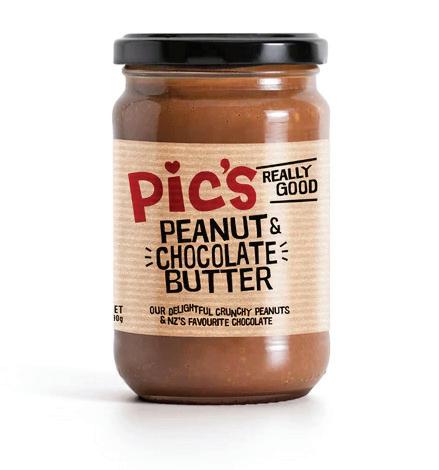











everything together and catch consumers' attention, with the latest trend being to give mascots some movement and variations to represent different flavour offerings.
It's important to remember that packaging design is more important than ever, with consumers focusing more on spending wisely. Brands need to create packaging that looks great and conveys value and quality. By embracing bold colours, playful typography, and fun design elements, FMCG manufacturers can create packaging that stands out on the shelves and makes a lasting impression on shoppers.



The Food and Grocery Council is an industry association for grocery suppliers providing members networking, events, industry information and strong advocacy. Contact us for information on the benefits of membership: raewyn.bleakley@fgc.org.nz







• Networking • Industry Updates

• Conference and Events

• Education and Training
• Advocacy and Law Reform
In 2018, the branding world was taken by storm with the rise of Blanding. A minimalist design aesthetic that took over major labels in the fashion world, most notably; Burberry, Yves Saint Laurent, Balenciaga, Berluti, and Balmain. Blanding is defined by a lack of historical references, clean lines, limited colour palettes, and an overall simplification, all embodied by sans serif fonts.
While Blanding may have once been a powerful tool for intuitive communication, its self-referential nature has resulted in a sea of indistinguishable brands needing more distinct
personalities, unique promises, and specific values. While big tech companies such as Apple, Google, and Uber have strong, streamlined identities that match their offerings, brands from all industries have moved to align with this message. However, eye-catching packaging and bold colours have become increasingly important in a sea of similar products, with brands opting for unexpected colour combinations and playful typography to stand out on the shelves. Vintage layouts and sticker book aesthetics are also making a comeback, invoking a sense of nostalgia and curiosity.
Additionally, brand mascots are another effective way to tie
While Blanding may have once been a powerful trend in branding, brands need to own their authentic personality and values to stand out from the sea of Blands. Looks may capture attention, but it's branding that inspires consumers to stay loyal.
 Caitlan Mitchell | Editor
Caitlan Mitchell | Editor
www.fgc.org.nz

The NEW ZEALAND BEVERAGE COUNCIL is an industry association whose members cover all aspects of the non-alcoholic beverage market both in New Zealand and the export markets.
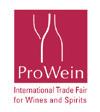




The Council members are spread throughout New Zealand and come together annually for a conference that covers industry issues and is addressed by international speakers. The organisation monitors product quality, sets standards for the industry and runs national competitions and awards.
PUBLISHER Tania Walters
GENERAL MANAGER Kieran Mitchell
EDITORIAL DIRECTOR Sarah Mitchell
EDITOR Caitlan Mitchell
CONTENT MANAGERS/ SALES Felicity-Anne Flack, Caroline Boe, Bailey Nickel
EDITORIAL ASSOCIATE Annabel Maasdam, Sam Francks
SENIOR DESIGNER Raymund Sarmiento
Next Payments offers end-to-end payments and technology solutions that deliver efficiencies and add value for your staff and customers. With over 20 years of industry experience, we work together with our clients to ensure that our cash management equipment provides shopping centers and retail businesses with the tools to grow and succeed.
Say goodbye to countless trips to the bank with a Next Payments
Cash Recycler at your business. You’ll have a personal bank at your fingertips that will allow you to handle all your cash management and reconciliation needs on-site. Plus, easily transfer funds and settle takings to any bank, at anytime.

Make cash withdrawals a breeze for your customers and passersby with a Next Payments ATM at your retail business. With free ATM on-screen advertising, you'll be able to easily promote your store's offerings. Plus, choose from a lobby styled ATM or one that is through-the-wall - whichever best suits your business' needs.
Quickly counts, sorts and stores all New Zealand denominations
Automatically dispense your customised float amounts
Set up multiple accounts for each area in your retail business
Integrate your POS system for instant reporting and reconciliation
Monitor your Cash Recycler’s data in real-time via Concilio
Unique employee logins for security and traceability
Automating cash handling in your business will reduce counting errors, shrinkage and counterfeits, helping you to increase overall store profits and save over hundreds, if not thousands, in labour costs each week.

Great transaction rebates and fair contracts
24/7 local support and field technicians
Free upgrades and maintenance
Lightning fast transaction speeds
Monitor your ATM’s live cash balance and more in real-time
Free on-screen advertising and ATM signage
Don't let EFTPOS outages hold your business backalways have a backup plan with an ATM on-site or nearby for cash payments. You'll be seeing increased in-store spend and revenue in no time.
Asupermarket is proud to share its six-month anniversary. Since the opening of Tokora's social supermarket, it has significantly impacted the community.
Under the leadership of BBM Founder Dave Letele and Supermarket Manager Norah Carlson, the social supermarket has been building strong relationships with other service providers in the area and supporting whānau in need.

The social supermarket has supported over 25 families weekly in the past six months. The supermarket provided Christmas hampers to families in need, which were greatly appreciated and a huge help, especially as most whānau in contact with the social supermarket were unprepared for the holiday season. Read more here.

Industry leaders have begun investing in ESG (Environmental, social, and governance) strategies to match sustainability incentives. Sustainability action is propelled through government, corporations, and consumer demand.
According to Astra, industry leaders of the market are using this environmental aspect of ESG to create a positive impact through various methods, including combustion, anaerobic digestion, aerobic digestion and pyrolysis, and gasification, wherein the waste is broken down into simple components, reducing the strain on the environment.
These strategies aim to redirect the byproducts of the food industry to be used as power sources to combat climate change. Read more here.
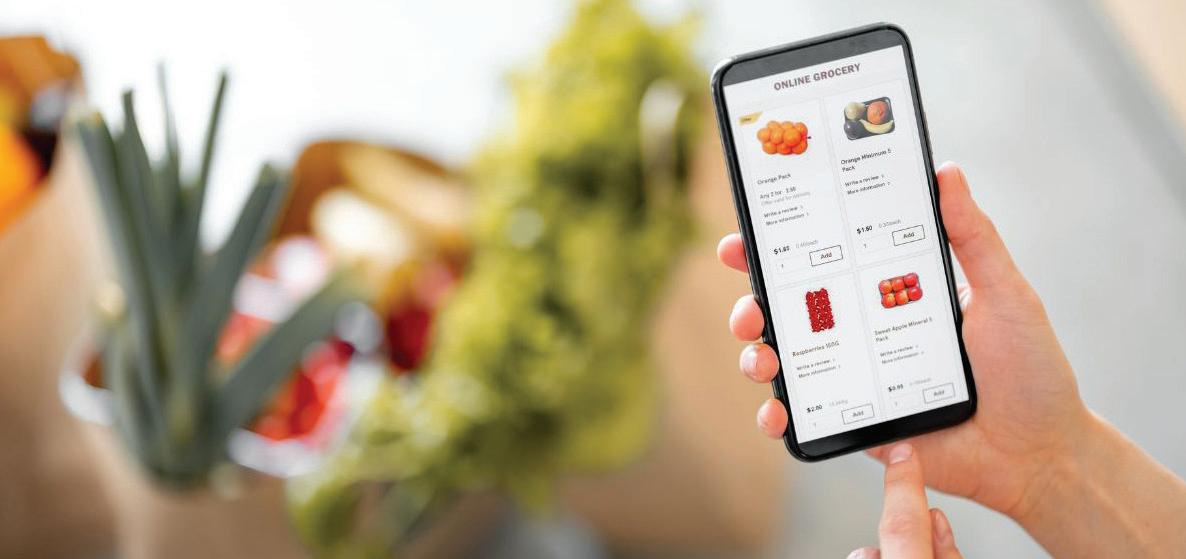
Foodstuffs South Island has announced its collaboration with an innovator at the front line of business solutions, with partners delivering a performance edge. Zebra Technologies Corporation and Foodstuffs South Island have entered a partnership using Zebra’s mobile computers, tablets and wearable scanners to achieve greater productivity, inventory visibility and accuracy, and improved shopping experience. Since 1928, Foodstuffs South Island has offered many shopping experiences, from grocery and convenience stores to large-scale supermarkets, wholesale, and specialty liquor stores. The company also owns recognisable retail chains Four Square, New World and PAK’nSAVE, and in-store private brands Pam and Pam’s Finest. Read more here.
Country Imports and Exports Limited and Vision Foods Limited recall all batches and all dates of its Yumo’s brand Chicken Flavoured Snack. Imported from Fiji, the snack is sold at various retailers, including, Get Fresh Mangere, Get Fresh Vege & Spice Centre, Hunters Foodtown Supermarket, New World Southmall, New Zealand Feeders, PAK’nSAVE Manukau, Fiji Foods Distributors New Zealand Limited. The snack is recalled due to an undeclared allergen (dairy milk). People with a milk allergy or intolerance should not consume this product. If this product has been consumed and individuals have health concerns, they are encouraged to seek medical advice. This recall does not affect you if you are not allergic or intolerant to milk.





The world's largest and most important trade fair for sweets and snacks with new highlights and a diversified event programme. A colourful selection of the finest sweet and savoury treats from around the globe on around 100,000 m² at the Cologne exhibition halls: ISM 2023! After the Re-start Edition last year, about 1,300 exhibitors from 70 countries will present the trends of the international sweets and snacks industry again this year, which means ISM is confirming its position as the leading global trade fair. The exhibitors include newcomers from Armenia, Costa Rica, Indonesia, Trinidad and Tobago and Venezuela. The share of foreign exhibitors is 88 percent. In total, there are 32 country pavilions from 25 countries and regions. Read more here.


Cost increases from grocery suppliers to supermarkets remained at elevated levels in March 2023. The Infometrics-Foodstuffs New Zealand Grocery Supplier Cost Index (GSCI) shows a 10.3 percent pa increase in what suppliers charged supermarkets for goods in March 2023, marking six months where the average supplier cost increase has been above 10 percent pa. Read more here.

Arataki Honey, New Zealand’s number one honey brand, has driven the honey category ahead with strong growth in high-value manuka honey. The total New Zealand market is valued at NZD 38m per annum, up eight percent on the 12 months previous and on a pathway to further growth.
Arataki Honey leads the market with a 34 percent market share.
The fifth-generation family business was established in 1944 and topped the list for its

high-quality Manuka Honey in New Zealand supermarkets. The 250g and 500g Arataki Honey Manuka are ranked first and second in the high-value mono-floral manuka honey segment. The Unique Manuka Factor (UMF) of the brand’s 250g Arataki Honey Manuka is ten plus, with the 500g range of the same product rating at 5 plus.
With tourist visitor numbers almost back to pre-pandemic levels and people proactively taking measures to live a healthier lifestyle, Arataki Honey is well-positioned with offerings to match these consumer trends.
Brand Manager Genevieve Renall stated that people seek out UMF-rated manuka honey.
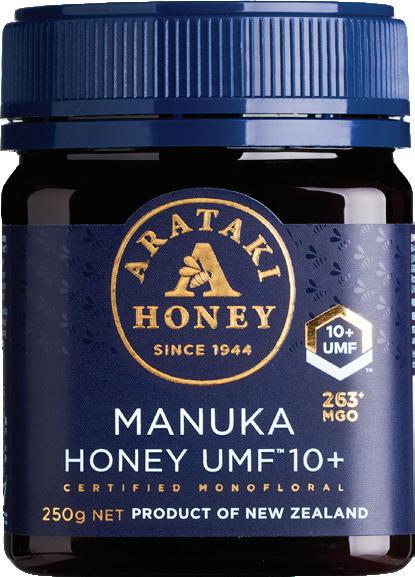
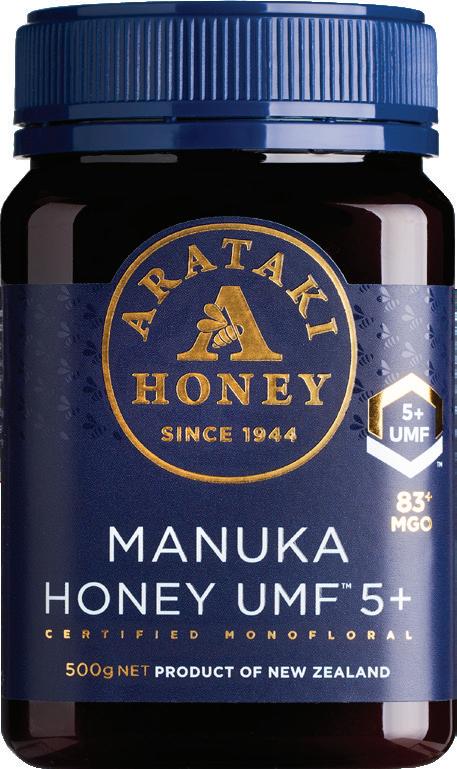

“UMF™ ratings of 10+ and 5+ give consumers the confidence to know they are purchasing the independently certified and internationally recognised genuine New Zealand mono-floral manuka honey,” said Renall.
Renall elaborated that the company’s manuka honey was packed under the UMF trademark and has been independently tested to validate manuka honey potency, authenticity, purity, shelf life and freshness.
As well as being the home to the country’s number one honey brand, Arataki Honey is one of New Zealand’s leading beekeeping enterprises.
Good hive management and increasing awareness of the health benefits of honey have seen what started as a small family business on a few acres of land become one of the most significant beekeeping operations in the Southern Hemisphere.
Renall stated that people and bees are at the heart of Arataki Honey. The fifth-generation family beekeeping business takes great pride in what it produces, representing its motto, ‘It’s in our nature’. n
Amajor supermarket chain has decided to strengthen its support for RainbowYOUTH, to fundraise NZD 100,000 for the organisation to continue its work supporting queer, gender-diverse and intersex youth. Countdown, the longtime supporter of RainbowYOUTH, shared that the fundraiser was part of the supermarket’s ongoing commitment to the Rainbow community in New Zealand. Read more here.




Horticulture New Zealand has invited all fruit and vegetable growers in Hawkes Bay to get together on Thursday, the 20th of April, from 3 pm, at the Ellwood Function Centre in Waitapu. Read more here.
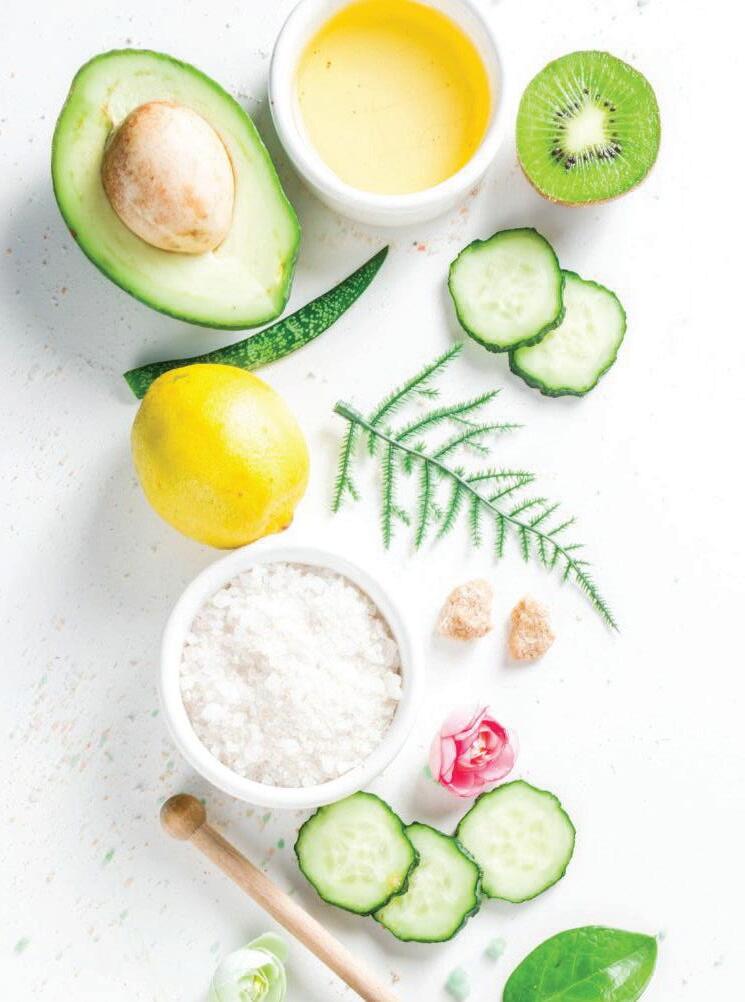
Recent data has revealed that the ethical food market will significantly grow in the coming years, influenced and propelled by increasing environmental concerns from consumers. Thye demand for fairly traded products, an incentive supported by many organisations, and the robust economic growth in emerging markets have also supported consumers in becoming more selective about the foods they consume and put their money towards. Read more here.




Patrick McKibbin, Chief Executive of the Chamber, who did a great job facilitating the event, estimates the sector combines to contribute $150m and over 500 jobs to the region, so is a very important part of the local business community.
This is likely replicated throughout the country, with many of these emerging businesses initially operating locally, some going on to successfully scale up and make it as bigger manufacturers, some staying in the garages or shared community kitchens they started in.
The group of manufacturers shared their start-up stories and current challenges. The stories of innovation and tenacity were both fascinating and inspiring. On the list of challenges, the tough labour market, endless supply chain issues, engagement with regulators, and confusing sustainability requirements were consistent with what I hear from the larger businesses I speak to daily. The more practical issues such as access to servicing of bespoke equipment and technical experts when you can’t have them on staff all the time were more particular to small businesses.
The passion in the room was palpable and uplifting. The sharing of knowledge and desire to help each other and have a strong local network was great to see alongside the support from the Chamber.
All these businesses were interested in how to engage with larger retailers and had varying knowledge of the Government’s current reform of the grocery industry. Prohibiting unfair conduct and promoting transparency, certainty, effective competition and a diverse range of suppliers – all stated aims of the Grocery Supply Code that is expected to emerge soon for consultation and are relevant to all food and grocery businesses – were of interest to them.
The Code will be enabled by the Grocery Industry Competition Bill, which is progressing through the parliamentary steps to become law, and the establishment of a Grocery Function at the Commerce Commission and a dedicated Grocery Commissioner. These changes are expected to deliver competition and efficiency in the industry for the long-term benefit of consumers. Given the regular concerns raised in the media by independent retailers and Consumer NZ, these changes can’t come soon enough.
The Food and Grocery Council is looking forward to supporting our members with webinars, training, and the opportunity to hear from the Minister of Commerce and Consumer Affairs and competition law experts at a series of events over the coming months.
A future where consumers, politicians, regulators, suppliers, and retailers – be they the established large retailers or independents working hard to give consumers choice – all have confidence the industry is operating efficiently and fairly would surely be welcomed.
This will benefit all of us who are passionate about this industry, not least of all the thousands of front-line workers who get up every morning to do a great job for New Zealanders and bear the brunt of disgruntled and suspicious consumers who right now may find making the best choices for their families tough and confusing. n
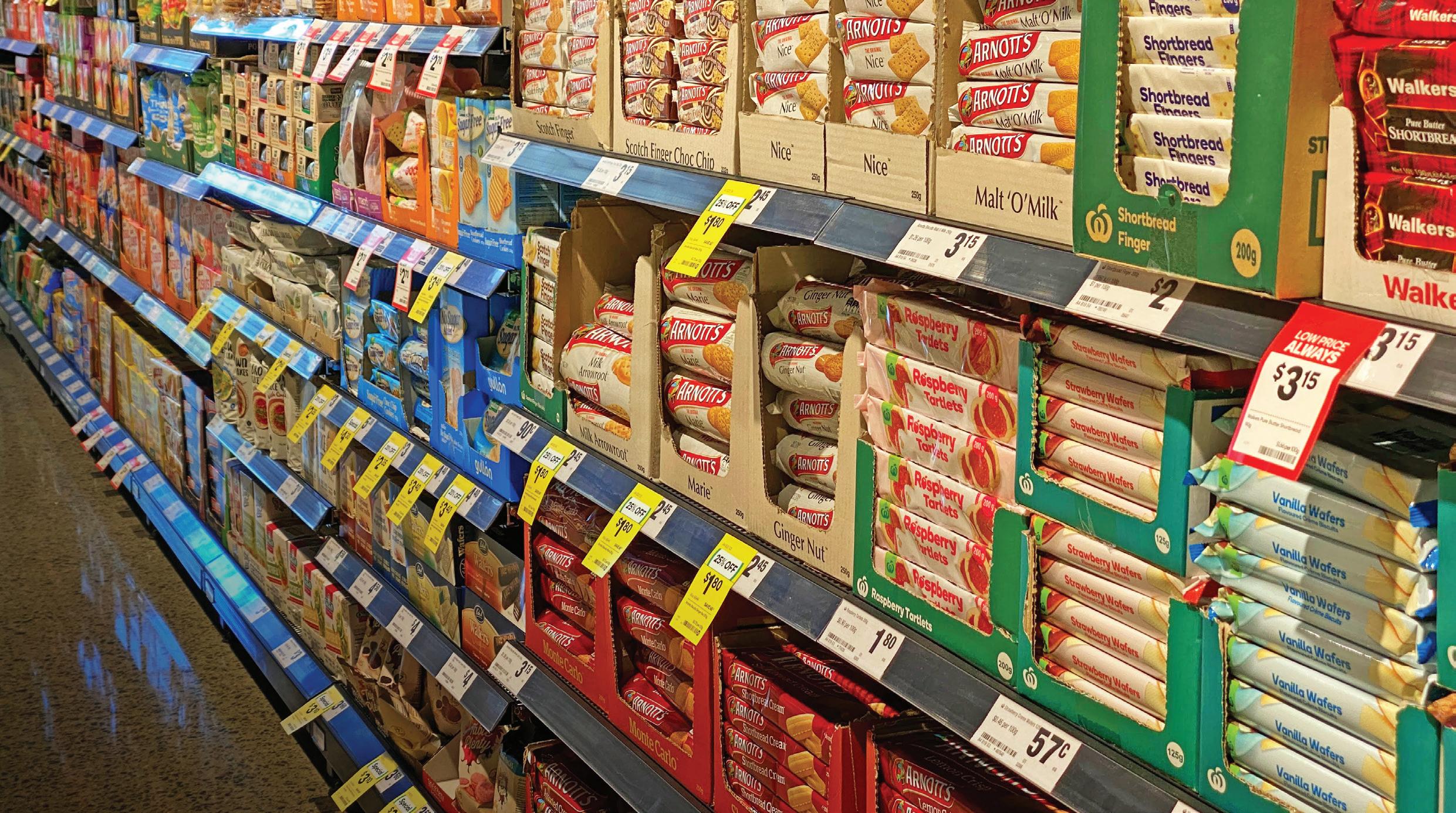





The inherent design and principles of a forklift haven’t changed some in decades but how we use them and how businesses operate have.
Google search forklift accidents in New Zealand and you’ll find a myriad of news stories and press releases about convictions.
WorkSafe New Zealand (WorkSafe) data will show that 127 employees across a range of industries have been seriously hurt since 2013 and a further 577 people have made claims to ACC for forklift-related incidents.

acceptance of industry, WorkSafe has yet to officially endorse the GPG as the replacement of the Approved Code of Practise of Forklift Training and Operations Practice (ACOP) since its submission earlier this year.
Until any such endorsement, the existing 1995 ACOP is unlikely to be revoked –meaning the industry is still legally governed by the present legislation.
However, NZFIA Chief Executive Rodney Grant believes the new guidelines will play a big part in modernising the industry, particularly helping to provide good practice for new operators before they commence work.

“We don’t necessarily have any sway to say to the industry, you must follow this document. But what we hope is, the marketplace will naturally follow them and realise that these guidelines are the result of consultation and feedback from all interested parties in the sector.
Rodney Grant Chief Executive NZFIAUnfortunately, some of the incidents have resulted in fatalities, a tragedy for everyone involved – something the New Zealand Forklift Industry Association (NZFIA) wants to help in stopping.
Almost two years of industry consultation, workplace engagement and widespread feedback throughout the sector has culminated in a new set of modern, fitfor-purpose forklift operating guidelines, helping to bring the forklift industry into the 21st century.
The Forklift Good Practice Guidelines (GPG) provide many sectors within the industry with more information and support around forklift operations.
And while it has the wide support and
“We prefer to say good practice, rather than best practice and that’s deliberate. Good is measurable, but it’s difficult to say what is best – the goalposts always shift and there’s always an opportunity for people to find improvement or do better, so no one wants to boldly say, this is the best way to do something. Essentially, good is a great starting point, and that’s what we prefer to focus on.”
So, why should anyone need to know or care about the GPG? Mr Grant says it will help you as business managers/owners know what is considered “good” in the ownership and operation of a forklift.
“I think we all want the same, to have our teams go home each day without being
hurt. This guideline does exactly that, gives you and your team the guidance to reduce the risk of harm.
“And some of the big shifts in thinking on the GPG are around the training of operators and ensuring they are measured in an easily recognised and consistent fashion.
“The GPG promotes the use of the NZQA unit standard framework for the assessment of operator competency. Ensuring your team is trained and assessed on the applicable type of forklift they


typically operate and there is constant workplace training, to ensure competencies are kept current is important.

The NZFIA has training resources available to assist you with workplace-based competency assessment. Ensuring your workplace trainers are skilled and competent to assess is just as important as operator competency.”

Further, the NZFIA has put together the Silvercard Forklift Training program as a way of having operators trained to the levels
described in the GPG.
Going forward, the GPG will be circulated throughout the industry, with Mr Grant and the NZFIA working with businesses to help provide context to the guidelines, and how they can be implemented into their operations.
In the meantime, Mr Grant is working to gain WorkSafe endorsement and hopes that, down the track, the Government can see the merits of the guidelines and ultimately replace the nearly 30-year-old ACOP. n



Specs: 1200 x 1000 x 800mm | Capacity: 710 Litres Loading: 700kg Dynamic, 2500kg Static | Tare Weight: 44kg Food grade plastic throughout
• Cost Effectiveness: Collapsed when not in use, reducing storage and transportation space requirements.

• Forklift Friendly: Mirrored New Zealand true 4 – way pallet footprint for simple, safe and superior stacking.


• Priceless convenience: Drop gates dramatically enhance ease of access and efficiency in stock control.
• Premium protection: Comprehensively protected in the hottest and coldest days.
• Core flexibility: Ultimate in durability, flexibility and adaptability, ensuring ideal suitability across all categories.
Plant-based lifestyles are becoming increasingly popular for several reasons, the most significant of which is related to consumer concerns for their health and the planet. The plant-based market has expanded as plant-based diets and lifestyles have become more accepted, particularly by younger generations. Popular everyday items which have seen staggering growth in innovation, variety and accessibility are items such as milk, cheese, and proteins.
The conscious consumer is wary and becoming more knowledgeable about the environmental impact of their decisions. According to new data, plant-based milk is currently receiving considerable attention for its crucial impact on overall health. As demand has soared, key producers and manufacturers of plant-based milk have focussed on increasing production capacity and innovating new flavours deriving from various plant-based ingredients to cater to a growing consumer base and demand.
The global plant-based milk market size is expected to reach a valuation of USD 19.8 billion in 2023, with an estimated compound annual growth rate of 9.9 percent over the next decade, with the market approximately valued to be at USD 47.2 billion by 2033.
Key factors driving consumers include increased awareness and concern over animal welfare and dietary sensitivities towards animalbased products. This trend has increased consumers turning toward vegan and vegetarian alternatives for everyday items.
Millennial and Generation Z consumers are the most vocal consumers of plant-based products. They are paying particular attention to the health benefits of plant-based products. This includes whether ingredients are organic and sustainably sourced. Millennials are becoming more knowledgeable about the adverse effects of food additives, artificial flavouring, and chemicals.
Consumer demand for plant-based products has also extended to plant-based proteins, with consumer trends towards plant-based diets driving the market growth. Like plant milk, plant-based proteins are becoming increasingly popular due to consumer concern for animal welfare, health, and environmentalism. The knowledgeable and conscious consumer is making decisions based on their products’ health and sustainability benefits, with a popular plant-based protein source, soy, being desired by consumers for its additional benefits and its use as an alternate protein source.
Soy protein has been shown to reduce the risk of heart disease, cancer, and other chronic diseases. It is also a good source of fibre and essential nutrients like iron and magnesium. Additionally, soy protein is a complete protein containing all the essential amino acids needed for human health. Other popular plant-based protein ingredients include wheat, pea, potato, rice, canola, corn, and more.
While plant-based proteins and milk have established a positive and tasty reputation, plantbased cheese has sometimes failed to equal its animal-based counterparts. However, demand for plant-based cheese has been consistent and will continue to grow with consumer interest and trends towards plant-based products. The market is expected to grow significantly over the next decade. Nuts such as cashews have become popular bases for plant-based cheeses. n
General Manager of Greater Goods, Sian Leonard, stated that the company is the first to market in the plant-based deli and chilled meat category. Founder of Grater Goods, Flip Grater, is a Parisian-trained Chef and owner of the awardwinning Christchurch Vegan restaurant Grater Good.
Grater Goods’ range of products is proud to be in the plant-based space with products crafted by a Paris-trained artisan whose ambition revolves around feeding customers and consumers delicious food to a high standard.
The driver behind Grater Goods, stated Leonard, was the company’s ‘ethical hedonism’.

“We’re a business whose ethos is about doing the right thing by the environment without compromising our love of the food experience,” revealed Leonard.
In the Grater Goods range, products such as its sliced pastrami and pepperoni salami have been well received by consumers, with Leonard describing the products as perfect for grazing platters.
Leonard stated that plant-based eating was no longer a trend. It was a lifestyle.
“The Food Frontier research into the plantbased eating habits of kiwis was conducted four years ago.”

Leonard elaborated that 30 percent of New Zealanders already identified as meat reducers or flexitarians for environmental reasons, while 10 percent identified as vegan or vegetarian.
General Manager stated In the four years that have passed, climate change has become even more of a reality for Kiwis, with most having experienced this first-hand with a wet summer and devastating floods.
The impacts of this have seen more New Zealanders wanting to become plant-based and involved in environmentalism, which included consumption at the dinner table. Furthermore, Leonard described the plantbased category as experiencing rapid growth.
In the last two years, 40 percent of shoppers in the store had evolved the category from a trend into a lifestyle choice, with numbers continuing to grow.
“Seventy percent of shoppers expect to find plant-based products alongside their traditional counterparts. We’re asking retailers to position plant based in mainstream category shelf locations to improve the ease of the shopper experience and decision making.”
Leonard’s described that the Grater Goods manufacturing philosophy was underpinned by the company’s crafting of products under the same roof as the Grater Goods restaurant.
The deli meats created by the company are made with the same carefully selected ingredients and culinary know-how as the meals served inside the restaurant. Leonard shares that this allowed consumers to enjoy each product at home.
Grater Goods’ most significant growth had been driven by the 30 percent of New Zealanders who identify as meat reducers or flexitarians.
Leonards explained that the business had been focused on creating authentic plant-based versions of deli meat products beloved by New Zealanders so that those transitioning to plant-based diets and alternatives wouldn’t have to compromise on flavour.
Grater Goods is responding to the recent explosion of varied convenient chicken options in the chilled hang-sell deli category. In October, the company plans to launch

New Zealand’s first-to-market plant-based sliced chicken. Perfect for sandwiches, chopped up with cranberry on a pizza or tossed in a salad.
Grater Goods has paved the way as the first plant-based range to sit alongside chilled deli meats.
“We know from the Kroger supermarket shelf trials that plant-based meat sales increase by 26 percent when positioned alongside their traditional counterparts. We know meat reducers and flexitarians expect to find alternatives next to the meat,”
Leonard stated the success of the plantbased meat integration with the meat aisles in Countdown supported this, with the brand offering shoppers an alternative while shopping in an easy-to-locate and convenient manner.
However, Leonard shared that she believed that the biggest challenge most New Zealand plant-based manufacturers faced was that most ingredients are imported, which creates an added cost, coupled with environmental impacts that can fly in the face of the plant-based manufacturer’s purpose. Leonard admitted that she’d like to see more government and private initiatives investing in domestic alternative meat and dairy ingredient innovation to not only step up New Zealand’s environmental and sustainability obligations but also reduce the cost and reward consumers who want to do the right thing with lower prices.
In the meantime, Leonard stated that the company would continue to source locally wherever possible.
Regarding her favourite Grater Goods product, Leonard’s choice would be her recipe Greek Toastie, which contained two slices of sourdough loaded with Grater Goods sliced pastrami, Savour nude Casheta, sun-dried tomatoes and fresh spinach.
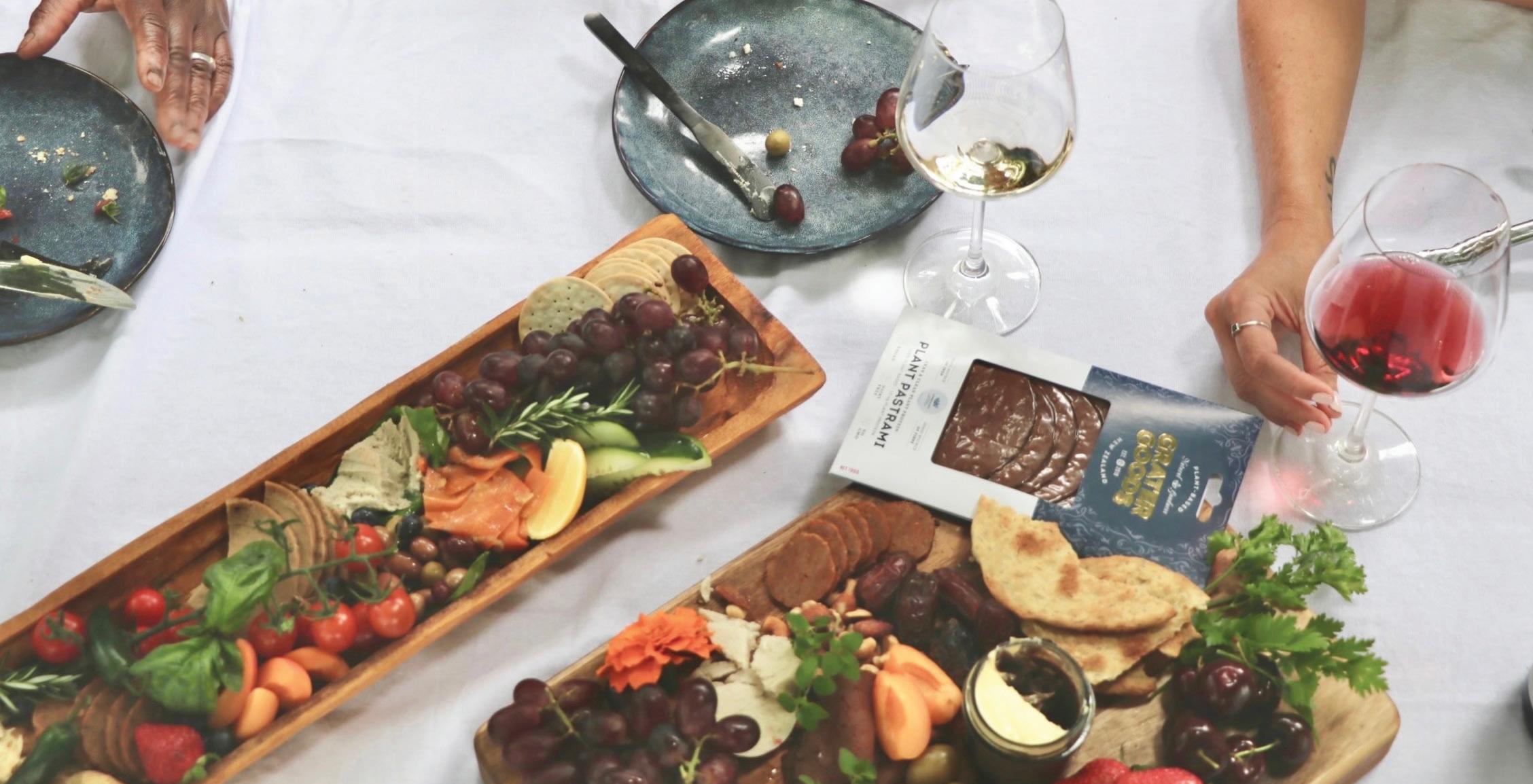
“Splash some olive oil in the pan, toast both sides and serve with a cold beer or a glass of Pinot Gris.” n


Sarah Phillipps, Head of Marketing at Raglan Food Co, revealed that the brand’s latest coconut yoghurt flavour, Feijoa & Pear, is one of a number of seasonal releases that will be released this year.

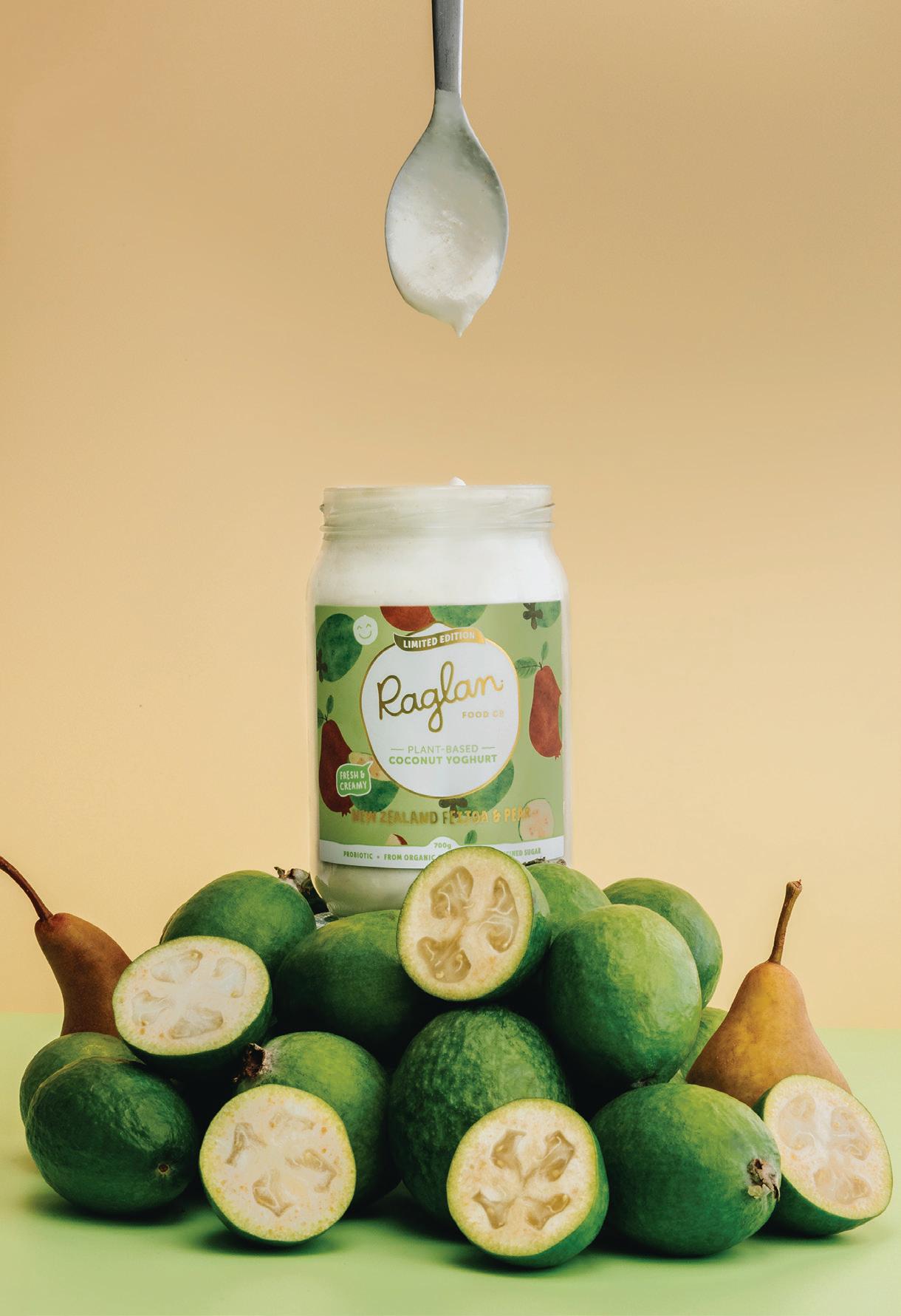
the new flavour had converted those impartial to feijoa, which Phillipps stated was a testament to the deliciousness of the new flavour.
“We've been enjoying the Feijoa & Pear with muesli, but it's delicious served as a dessert accompaniment.”
The new flavour is crafted at Raglan Food Co like each of the company’s yoghurts, proudly a plant-based, dairy, gluten and GMO-free product containing zero refined sugar and boasting billions of probiotics per serving.
Phillipps shared that the plant-based food producer and company was heartened to see the growing demand and consumer interest in plantbased products. The company has noticed an increase in flexitarian consumers who hold the same standard of texture and taste for plant-based products as they hold for traditional counterparts.
Raglan Food Co has worked hard to create creamy and delicious products, proving that plant-based diet options won't require consumers to compromise on taste, texture or nutrition.
created the range to be colourful and appealing on the shelf.
Phillipps shared that the company acknowledged that there weren’t always perfect solutions for sustainability. However, Raglan Food Co was proud of its purpose and approach to sustainability.
“We're always looking at how we can improve and make a meaningful impact.”
The popularity of Raglan Food Co’s products could be attributed to each of the products' consistency of delicious flavour and texture, with consumers often becoming life-long customers of the company’s product range. While consumers enjoy traditional flavours, Phillipps shared that the brand had noticed trends towards more decadent, dessertlike or novelty flavours.
Raglan Food Co prioritises research and customer feedback and commits to extensive taste testing when creating a new flavour.
We have criteria we like to meet when considering a new flavour. What makes our dairyfree yoghurts unique is our ingredients and clean labelling.
Sarah Phillipps Head of Marketing Raglan Food CoThe inspiration behind the new flavour can be attributed to numerous factors, including seasonality, global food trends, requests from customers and Raglan Food Co’s love of using locally sourced ingredients.
“There's also something very nostalgic about this flavour. Our team all have memories of feijoa-laden trees from their childhood, feijoa crumbles, or simply scooping juicy spoonfuls of this unique fruit,” shared Phillipps.
Phillipps described the new yoghurt flavour as subtly sweet and teeming with flavour. The Head of Marketing boasted that
Furthermore, Phillipps shared that the company had observed that health, ethical dietary choices and demand from younger generations had been the key factors propelling the dairy-free trend. Research revealed that consumers are increasingly weighing the above factors when purchasing.
Raglan’s manufacturing philosophy is centred around being ‘uncompromisingly good’. The company refuses to compromise on taste, health, environmentalism, and ethical practices. Each of Raglan Food Co’s products is packaged in and housed in glass jars, which are recyclable, reusable, and repurposable, with the Phillipps stating that the company has
The company’s long-standing Vanilla Bean flavour has five ingredients, with competitors of Raglan Food Co, which are vanilla flavoured, containing anywhere between 10 to 16 ingredients. Vanilla Bean also happens to be Phillipps’ favourite flavour.
“But honestly, this new Feijoa & Pear is a close second and very more-ish.” n

From the makers of Harvest Snaps comes Hooley’s Rings. The gluten-free snack is in toe-to-toe popularity with the brand’s Pea Snaps.
The new holey snack comes in various playful flavours that will have your tongue dancing. Available in Original Onion, Sweet Chilli, and Herb & Cheddar flavours, each classic and renowned taste is perfectly paired with your favourite dip.
Hooleys’ Ring isn’t just a delicious snack. They are the perfect party treat, sure to become the main event.
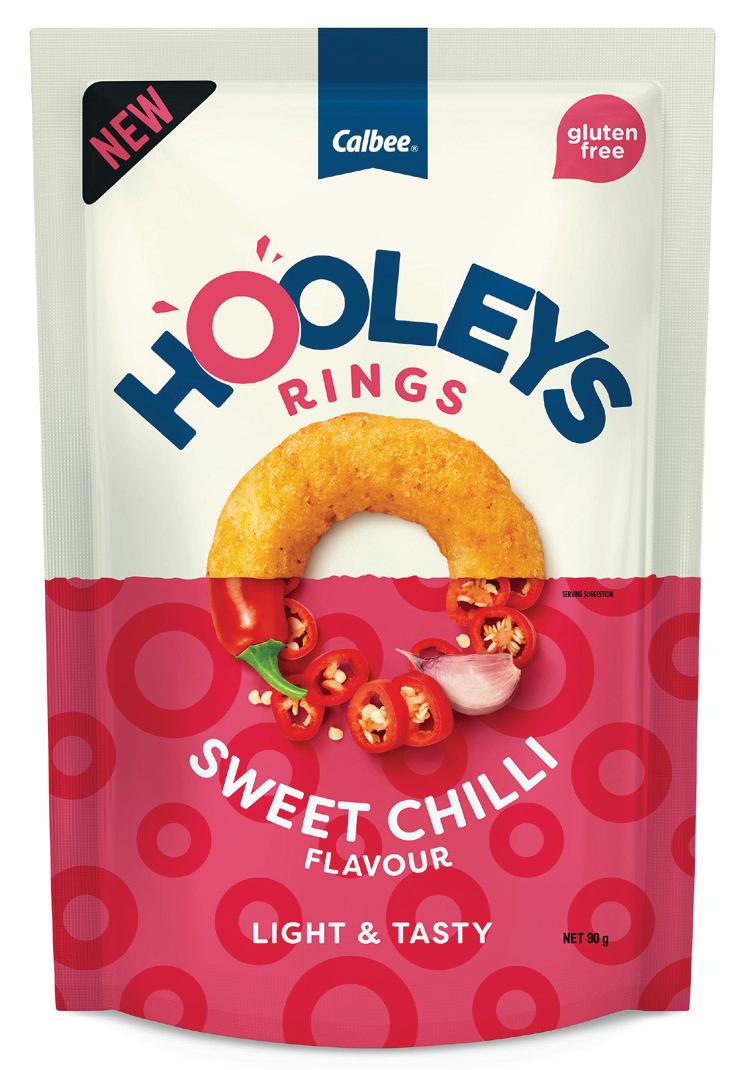
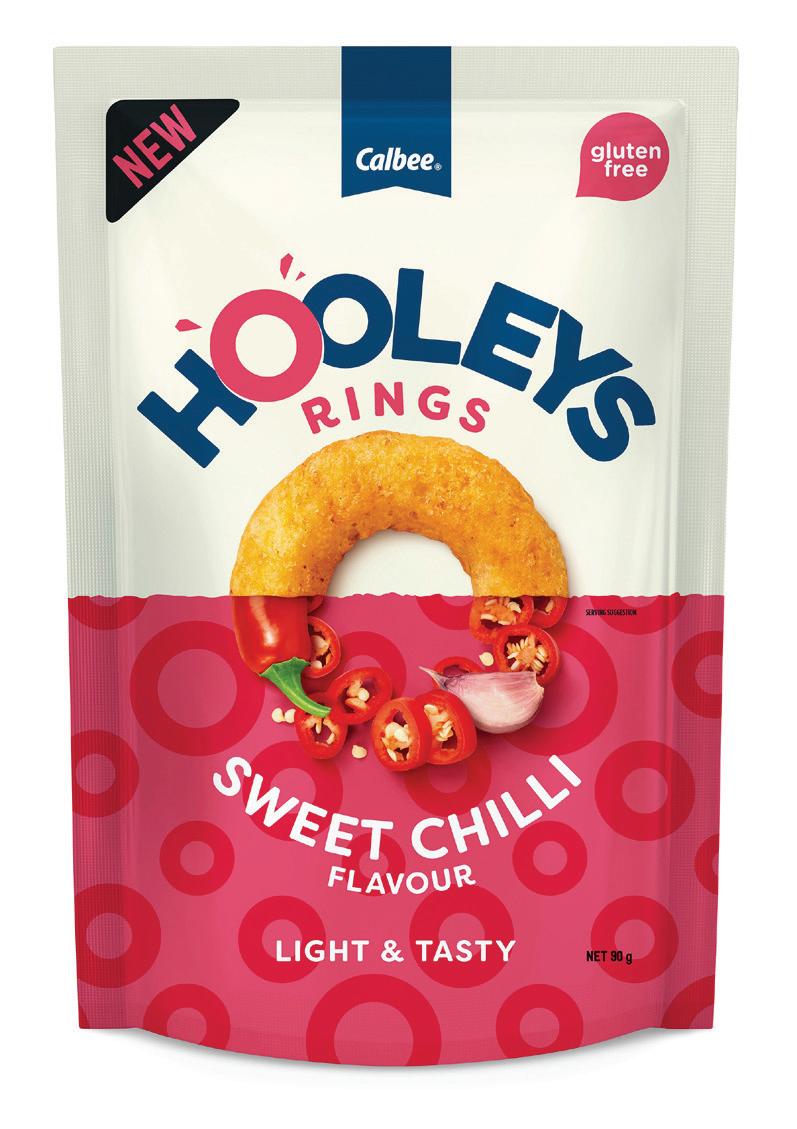

Put a Hooleys’ Ring on it. Available in the snack food aisle at your select New World and PAK’nSAVE stores nationwide.

For enquiries, call 09 410 1066 or email sales@houseff.co.nz or visit https://houseff.co.nz.
Chickpeas, the new snacking champion. Hippeas Chickpea Puffs are the new scrumptious plant-based crunchy snack on the market.


Gluten-free and vegan, the Hippeas Chickpea Puffs are jampacked with protein and flavour, with each bag containing only 92 calories. A handful of Hippeas Chickpea puffs contain no palm oil or MSG and are an excellent source of fibre, boasting a host of taste sensations, including, Take it Cheesy, Salt & Vinegar Vibes, Sweet & Smokin’, and In Herbs We Trust. Chickpea puffs aren’t just delicious and healthy. They are also environmentally conscious, as Chickpea plants naturally release nitrogen back into the earth as they grow.
Hippeas Chickpea Puffs will be available in Countdown stores nationwide from March 2023.
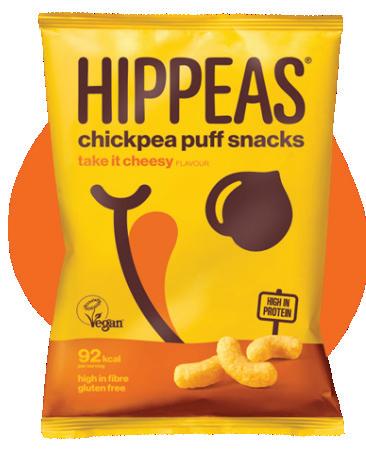

For any questions, call 09 410 1066 or email sales@ houseff.co.nz or visit https://houseff.co.nz.



DJ & A’s globally number one selling Shiitake Mushroom Crisps are a nutrient-dense snack made with authentic vegetables by a unique vacuum cooking. This cooking method uses less oil, baking at a lower temperature to preserve the natural veggie goodness and delicious taste.

The crisps are all-natural, vegan-friendly, and an excellent dietary fibre source containing no added MSG, artificial colours, flavours, or preservatives.
Perfect for on-the-go snacking, cooking, or as a tasty addition to favourite dishes or salads.




DJ & A have a range of five tasty variants, including Shiitake Mushroom Crisps, Broccoli Florets, Beetroot Slices, Roasted Edamame, and Teriyaki Green Peas.
All variants are available at selected New World and Pak’n Save stores.
For further queries, please contact Dee at Plum Agencies at 021 1168 018 or email us at admin@plumagencies.co.nz. More variants are available online at iGrocer NZ, igrocernz.com.
Be Right is a plant-based pasta range that offers delicious and healthy alternatives to traditional pasta. Made with high-quality ingredients, from Black Bean Flour, Soy Bean Flour and Edamame Flour, this pasta range is rich in
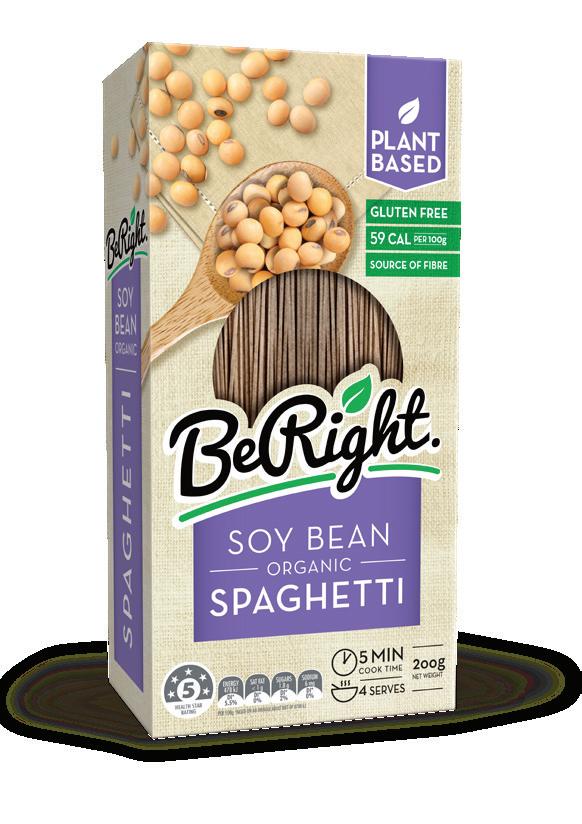
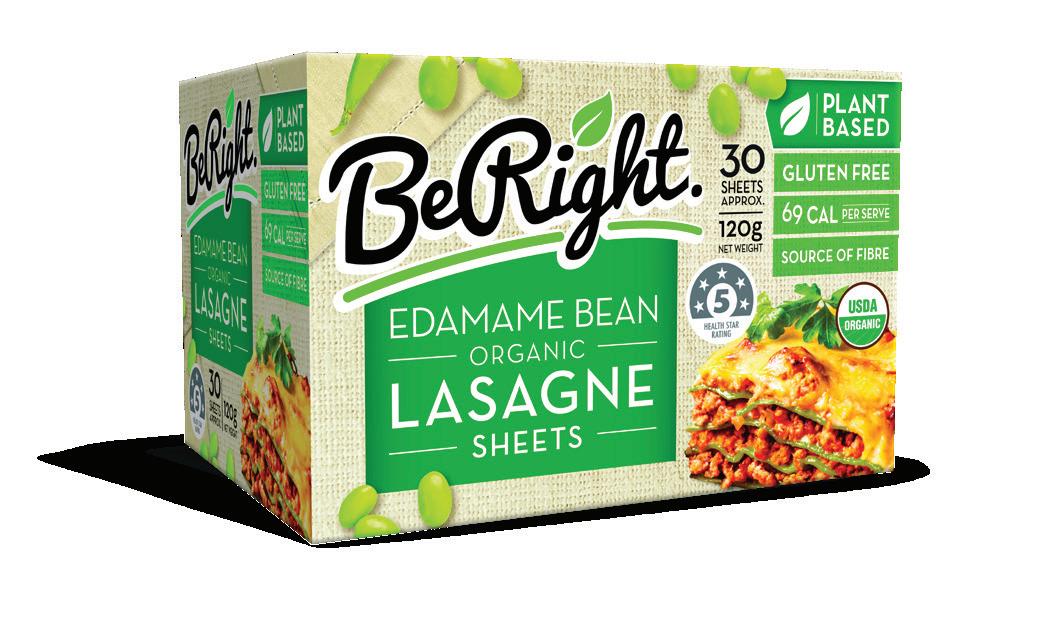
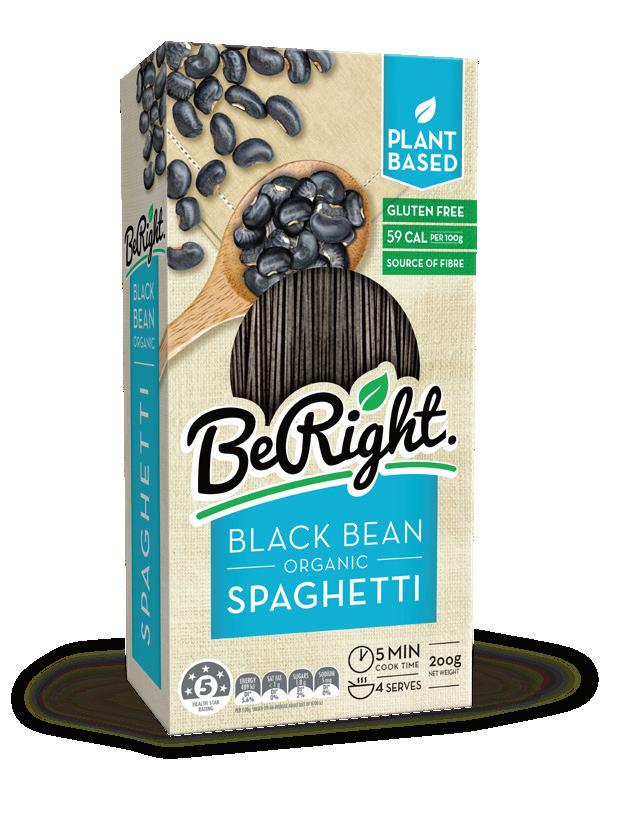


protein and fibre, making them a nutritious choice for any meal.














The Be Right pasta range is vegan and gluten-free, making it a perfect option for people with dietary restrictions. It is also free from artificial preservatives,


additives, and colours, making it a healthier alternative to other processed pasta.

With a five-star health rating, this organic, keto-friendly pasta comes in various shapes and sizes.


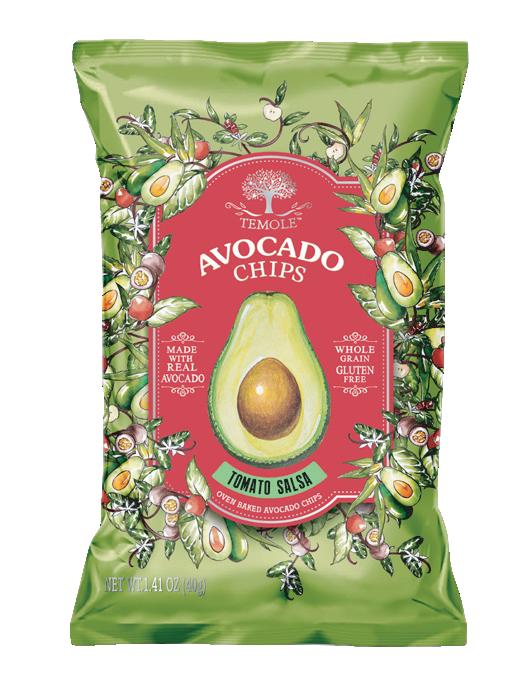

From Plant-Powered Spaghetti to

Lasagne Sheets, Be Right has a range to suit various tastes. Be Right is a healthy and sustainable pasta option that doesn't compromise taste or texture.

Gropak, the pioneering potatogrowing manufacturer, was established in 1997.

Andrea Buchanan, Company Director of Gropak, shared that Gropak’s potatoes are a varietal initially bred in the Netherlands.
The low-carbohydrate, low-calorie potato has taken time to build up to commercial quantities. However, the varietal's popularity in Europe is promising for the potato varietal here in New Zealand.
The introduction of the potato varietal directly aligns with growing consumer interest in health and well-being, the conscious consumer desiring to have healthier options available and accessible to them of the foods they love.
“Fewer potatoes were consumed as consumers opted for other food groups. We wanted to offer something different, and this brand was being marketed in Europe successfully, so we bought it in New Zealand,” revealed Buchanan.
The potato seed is grown in the South Island, with various growers spread nationwide. Packaged under the Sunlite brand, the Gropak packhouse is adept in washing, sizing and packing several vegetables, including potatoes, onions, carrots, brussel sprouts and yams. However, Gropak also has a processing room, where the company specialises in specifically shredding certain vegetables such as carrots, carrot

Temole is on a mission to re-invent healthy snacking and make it accessible to everyone.


The brand has combined healthy and tasty ingredients, mixed with carefully selected spices, to create uncompromisingly delicious snacks for all ages. Temole has already made waves with its commitment to producing high-quality, healthy snacks catering to various dietary needs. These oven-baked snacks are made from whole grains, vegetables and other 100 percent natural ingredients, making them a great choice for those looking to improve their snacking habits.
For those who suffer from celiac disease or gluten sensitivity, finding tasty and healthy snacks can be challenging. However, Temole snacks offer a great solution. These snacks are made from gluten-free grains, such as brown rice and quinoa, which are all great sources of fibre and protein. All Temole snacks are ovenbaked rather than fried, which means they are
batons, beetroot, and sliced and diced onions.
Buchanan explained that significant care goes into the growth of the low-carbohydrate, low-calorie potatoes. Each paddock is tested in an independent laboratory to ensure the quality and commitment of the potato benefits are delivered as the company promises.

This occurs before harvest nationwide, ensuring the potatoes are grown according to Gropak’s criteria for the benefit of consumers.
The Company Director shared that her favourite dish to prepare the potato with was the classic and delicious potato salad.
“Sunlite Low Carb Potatoes have a lovely creamy yellow colour and are very light, so the potato salad is very light and refrigerates well for the next day.”

lower in fat and calories than many other snack options while giving a satisfying crunch.
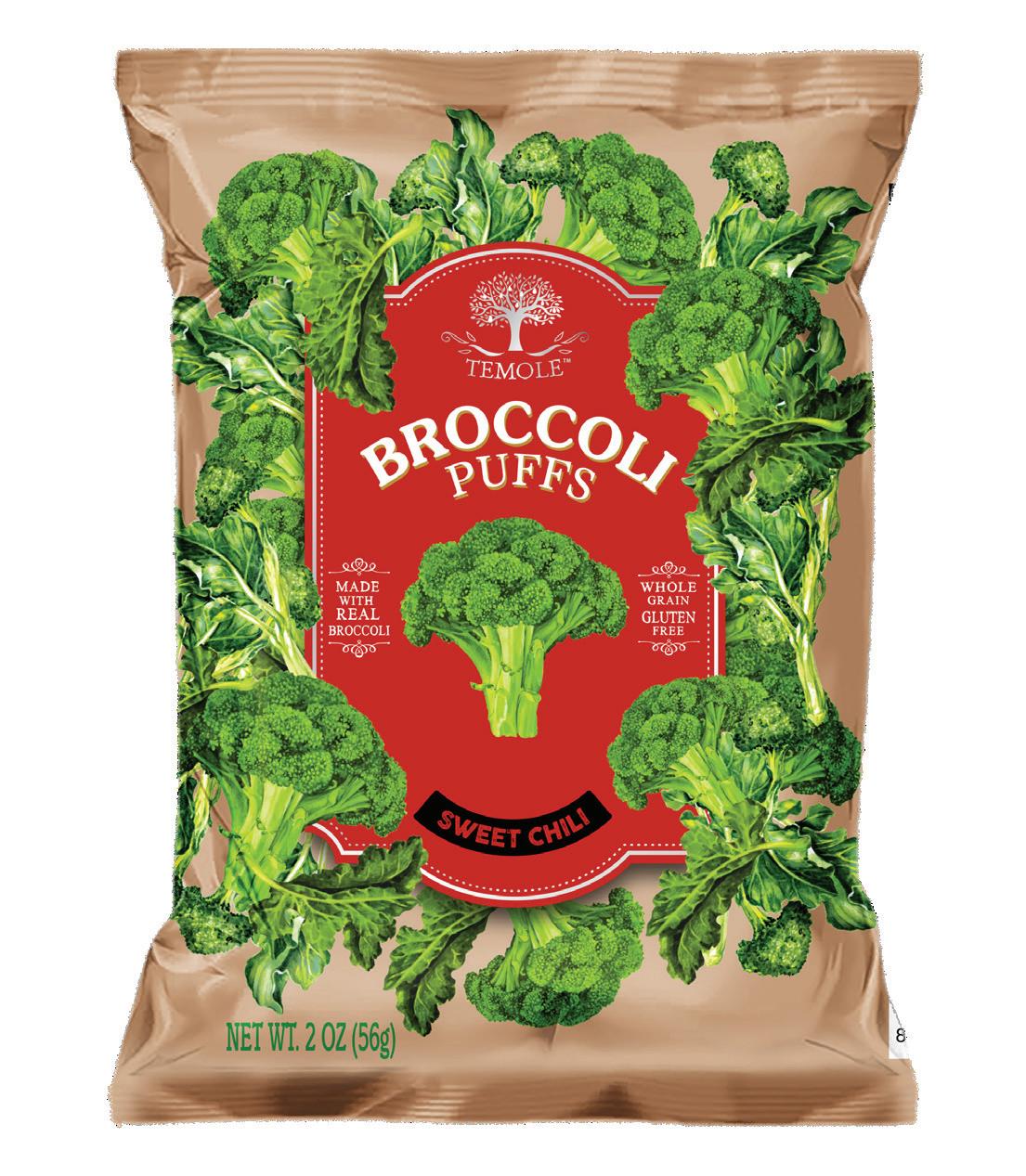
For those who follow a vegan diet, Temole offers excellent options, as many of the brand’s snacks are veganfriendly. This makes them an excellent choice for people who are looking for plant-based snack options.
Temole snacks offer an excellent option for all looking for healthy, tasty snacks catering to various dietary needs. Its snacks come in various formats, including almond chips, avocado chips, cauliflower puffs, broccoli puffs, rice and quinoa waves, cashew and kale waves, and soon-to-be-released veggie waves.
Temole lives by the motto that life is too short to eat boring food, so get crunching today.
Vitasoy Oat Milky has all the benefits of oat milk, with a milker, closer-to-dairy mouthfeel.
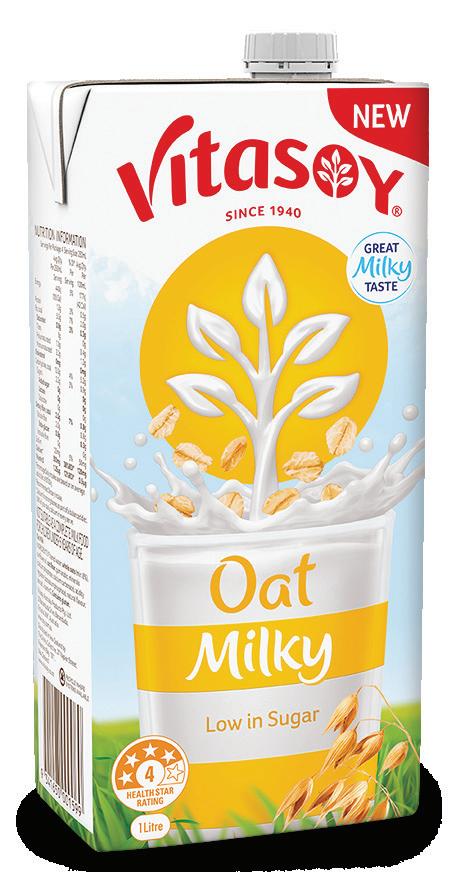
Vitasoy’s Oat Milky is a delicious, healthy, unsweetened milk alternative and the perfect allrounder to complement milk occasions. Brimming with Oat-some goodness, Oat Milky is enriched with calcium to support strong bones and is a natural source of beta-glucan and fibre.
Find Vitasoy Oat Milky in all major Grocers in the long-life milk aisle. n
New Zealand plant-based milk manufacturer and producer Boring is the perfect addition to the vibrant plant milk category. Smooth, creamy, and delicious, Boring Oat Milk complements coffee by letting the espresso shine while holding its texture nicely when poured.

Great for the pros in cafes and everyday milk stuff at home, Boring is boringly similar to regular milk, just without the milking bit. It doesn’t even come from anywhere fancy, like Sweden. It’s made in New Zealand using New Zealand oats. Consistency, texture, taste, sustainability. Boring takes care of all the boring details so consumers can focus on what they do best. n
New Zealand brand, Little Island, has expanded its well-known range of award-winning dairy alternative ice cream, ice blocks, yoghurt, and milk. Little Island has taken a fresh look at the supermarket offering with the launch of its new blended milk range in stores this April.
The range includes Almond with Oat, Oat with Coconut, Original Coconut, and Chocolate Coconut milk.
Blends make for better-tasting and more balanced milk and deliver more functional health. Little Island’s milk range is unsweetened, providing 25 percent of daily recommended calcium intake, D2 and B12, and are phosphate free. Each milk goes well in smoothies, cereal, or breakfast bowls, and all four can be foamed and added to daily coffees. n

Plant Projects, a plant milk manufacturer, has described now as a bountiful time for plant-based milk. In supermarkets, the refrigerated aisle is overflowing with new alternatives ranging from almond, hazelnut, cashew, coconut, hemp, and oat.
With such variety, Plant Projects has questioned whether plant milk has peaked.
“Not even close”, said Jamie Wilson, Manager of New Zealand food innovators at Plant Projects.



“I don’t think there’s an end to alternative dairy innovation.”
Wilson’s company Plant Projects was designed to disrupt the alternative milk industry with its No Ordinary Plant Milk, made from peas.
Plant Projects is the first New Zealand-owned company to produce milk made from peas, and Wilson described it as the ‘ultimate alternative’.
Wilson hoped it would ‘appease’ consumers who care about the environment as equally as their health.
“Peas are one of the most sustainably sourced ingredients in the planting world. They’re quickly grown, don't require a lot of water and are light on emissions.”
Wilson elaborated that the brand’s No Ordinary Plant Milk boasted the lowest environmental impact compared to its plant-based competitors. Secondly, its nutritional protein and carbohydrate profile was extremely close to its traditional dairy counterpart.

Unlike its nearest rival, oat milk, No Ordinary Plant Milk contained two to three times more protein, with significantly fewer carbohydrates and 50 percent less sugar.
Wilson described peas as a better ingredient base, reflected in its nutrition panel and allergen front. No Ordinary Plant Milk is gluten, soy, nut-free, keto-friendly, silky smooth, and versatile.
Wilson shared that neither cows nor peas were needed for the next iteration in alternative milk as he was confident that the future would be lab-made dairy products. Plant Projects has created plant milk comparable to cow's milk's exact taste and texture without using land, emissions, or animals.
Wilson shared that the one barrier for alternative milk has been its price point compared to dairy, for which he believed lab-grown could be a solution.
“But for now, we have peas.” n

For dairy-free consumers, almond milk is a staple milk alternative that perfectly complements a cup of tea or coffee. The unique formula that makes up Blue Diamond’s Almond Breeze comes from over 100 years of experience growing and harvesting California’s finest almonds. Many growers have been coop members for generations, so plenty of family pride goes into each carton of Almond Breeze. Barista Blend is readily available through James Crisp. n
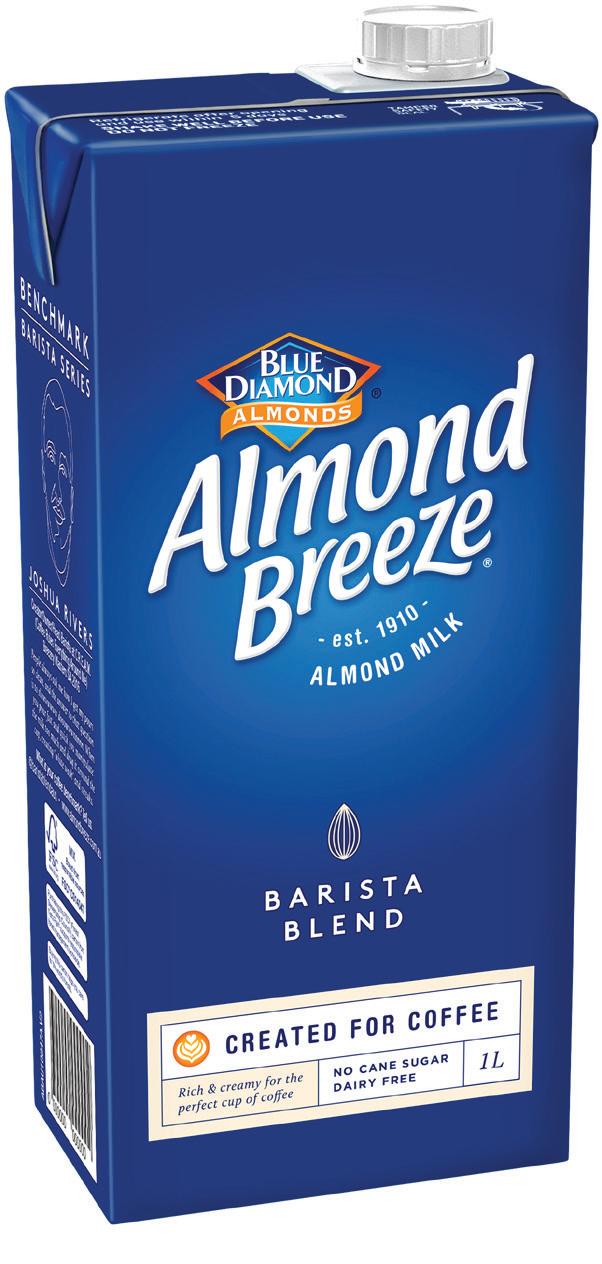
Alpro is here to help consumers. The brand shared that while being healthy can be tricky and pesky old habits die hard, Alpro wanted to help people who wish to change with its delicious plant-based milk range.
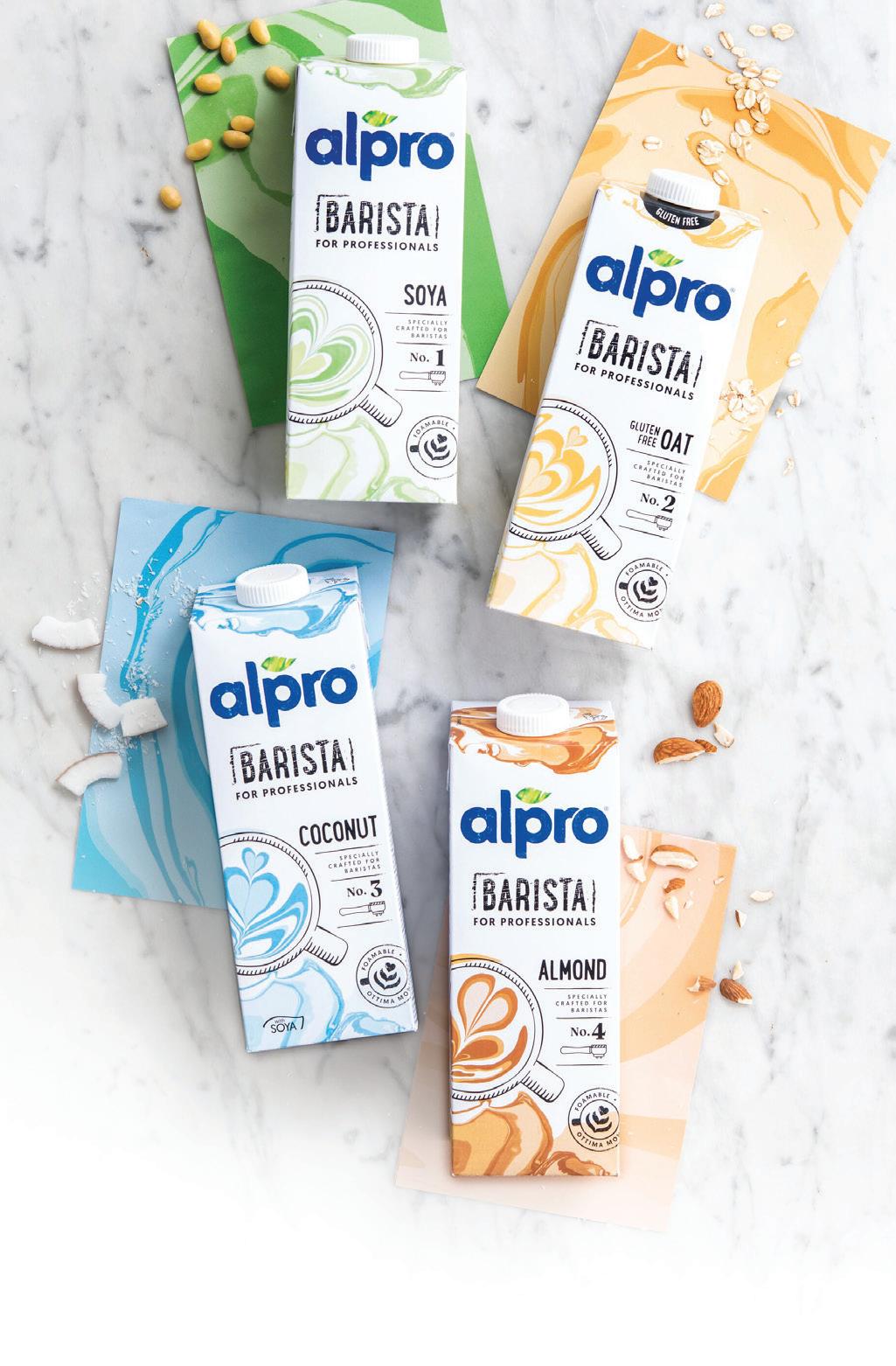
Alpro is all about cheerleading life’s triers because any step, big or small, is a positive step in the right direction. Progress is progress, which Alpro has believed in ever since becoming a plant-based pioneer in the 1980s.
Alpro’s ‘for professionals’ range tastes excellent and is 100 percent plant-based, available in Soy, Almond, Coconut, and Oat.
Alpro is a proud sponsor of the World Barista Championships in Athens, Greece, from June 21st to the 24th, 2023. n
Organics, Daniel Chalmers, shared that the plant-based food developer and manufacturer created its dairy-free cheese range, under the company’s Zenzo brand, for consumers as it aligned with the company’s values.
onsumers need dairy-free products both for the benefit of their health and that of the planet,” revealed Mr Chalmers.
Mr Chalmers elaborated that when Zenzo created its range of dairy-free cheese, the market for dairy-free cheese available to consumers differed from its traditional counterpart regarding flavour, texture, and functionality.
Zenzo’s cheeses, particularly its cheddar, have filled the hole in the market, with its flavour and texture second to none. Mr Chalmers said the company was the first to create plant-based cheese in New Zealand that melted its traditional counterpart.

“Our cheddar and mozzarella hold first place prizes at the vegan cheese awards in both categories.”
As well as the cheese awards, Mr Chalmers shared that its market sales data reflects the popularity and consumer love for Zenzo’s products. Zenzo’s cheddar and mozzarella kinds of cheese have been in first and second place in the New Zealand market for many years. This can be attributed to comparability to its traditional counterparts.
Zenzo’s cheddar is slightly sharp and drier than the mozzarella, which is softer and mild, as one would expect from mozzarella. Both melt as conventional cheese would, which they are renowned for by consumers and differing organisations alike.
Mr Chalmers revealed that Zenzo would release a range of feta, blue, and cream cheeses in the market this year, the characteristics of which the Executive Director assured would be equal to traditional cheeses. The company’s current new release of grated cheese and mild and tasty cheese slices has been received well by consumers.
With plant-based alternatives becoming increasingly popular, Mr Chalmers shared that this popularity in plant-based diets and lifestyles has been noticed, with a significant uplift in the last three years, which Mr Chalmers stated has begun to settle.
The category has maintained its significant market share and has held onto the rapid growth it gained within this time.
“It grew so quickly that it was overdue to settle down. We have been making plantbased foods for 25-plus years, so we are used
to the ups and downs.”
Previously the company had specialised in tofu. However, consumer interest and demand have allowed Chalmers Organics to expand into cheese, yoghurt, sour cream, aioli, and more, under its Zenzo brand.
Mr Chalmers described the changes in demands as a consequence of consumers becoming more knowledgeable about the impact of their food choices, with a growing realisation of why plant-based diets matter. Consumers are looking for animal-free, low-cholesterol alternatives, and environmentalism has become equally important as caring for oneself.
For the future, Mr Chalmers hopes that whole foods will be the market leader.
“Whole Foods can bring positive change to the human body. While I support dairy and meat alternatives as a great step in the right direction, the true future of food should be whole foods and preferably organic.”
Zenzo’s philosophy towards plant-based foods centres on giving animals and the planet a break while providing consumers with healthy options that avoid cholesterol. Mr Chalmers stated that Zenzo uniquely focuses on quality equivalent taste and texture experience. The company takes pride in creating options for consumers that don’t compromise on the factors of traditional counterparts that consumers enjoy.
Mr Chalmers shared that the company promotes plant-based lifestyles for many reasons. However, a significant one is related to encouraging more vegetables into consumers’ diets, with balance being the key feature the company promotes. n
Savour, an award-winning premium plant-based epicurean cheese company, was launched by Auda Finan in 2017.

Savour aims to produce delectable plant-based foods to satisfy any cheeseloving connoisseur that can complement any platter or cheese board.
A highlight for Savour was its Supreme Award win in the 2022 New Zealand Vegan Cheese Awards, coupled with the brand’s Silver Award winner in the 2022 New Zealand Artisan Food Awards.
Savour’s mission is to grow the plantbased dairy category by launching premium dairy alternatives in more stores targeting health, environment

and ethics-led consumers across New Zealand.


The brand’s range of vegan cheeses is crafted as a functional food from activated, cultured cashews, rich in protein and loaded with billions of probiotics for digestive health.

Savour’s premium economic everyday range of feta, ricotta and butter has received positive consumer feedback for its comparative texture and flavour equalling traditional cheeses.
Stocked at selected supermarkets throughout New Zealand, including New World, Moore Wilson, Farro, Fresh Choice, and Raeward Fresh. n

Dairy-free products that deliver on taste
Dairy-free products that deliver on taste and convenience are what the Veesey range of products is all about. The Goodfood Group Veesey cheese range is packaged in bright yellow to reflect the brand’s aim to provide everyone with simple, easy and tasty dairyfree products.

Veesey’s dairy-free cheese range includes Grated Mozzarella that is perfect and convenient for melting, Mozzarella Blocks to serve everyday cheesy kitchen needs, and Tasty or Cheddar slices for an easy, delicious sandwich on the go.
All Veesey Cheeses are gluten, soy, lactose, and palm oil free. The cheeses are instead created using coconut oil.
Veesey products are available in all leading supermarkets throughout New Zealand. n
Plan*t is a Sustainable Foods brand founded by Justin Lemmens and Kyran Rei, who have a combined 40 years of experience in food manufacturing and hospitality.
With the fast-growing plantbased industry and consumer interest in sustainable, environmentally-friendly food products, Lemmens and Rei have created a range of New Zealand-crafted plant-based products for conscious New Zealand consumers.
Part of the plan*t business model is its field-to-plate approach, where the company has mindfulness of the environmental impacts of its ingredient sourcing across its production, packaging, ecosystem, and partnerships. Meats and dairy use the vast majority of farmland (83 percent), producing 60 percent of agriculture’s greenhouse gas emissions. Plant-based protein uses 47-99 percent less land and water resources, making it an appealing alternative.
Each of plan*t’s products is natural, with minimal processing, containing pea and soy proteins, and crafted using novel ingredients like New Zealand-grown hemp. None of the products contains artificial
flavours, preservatives, or colours. All products are also GMO, hormone, and antibiotic-free.
Products in the plan*t range include plant-based Chick*n, Crispy Chick*n Strips, Southern Fried Chick*n, Ground Mince, Chick*n Nugget, sausage in Sage
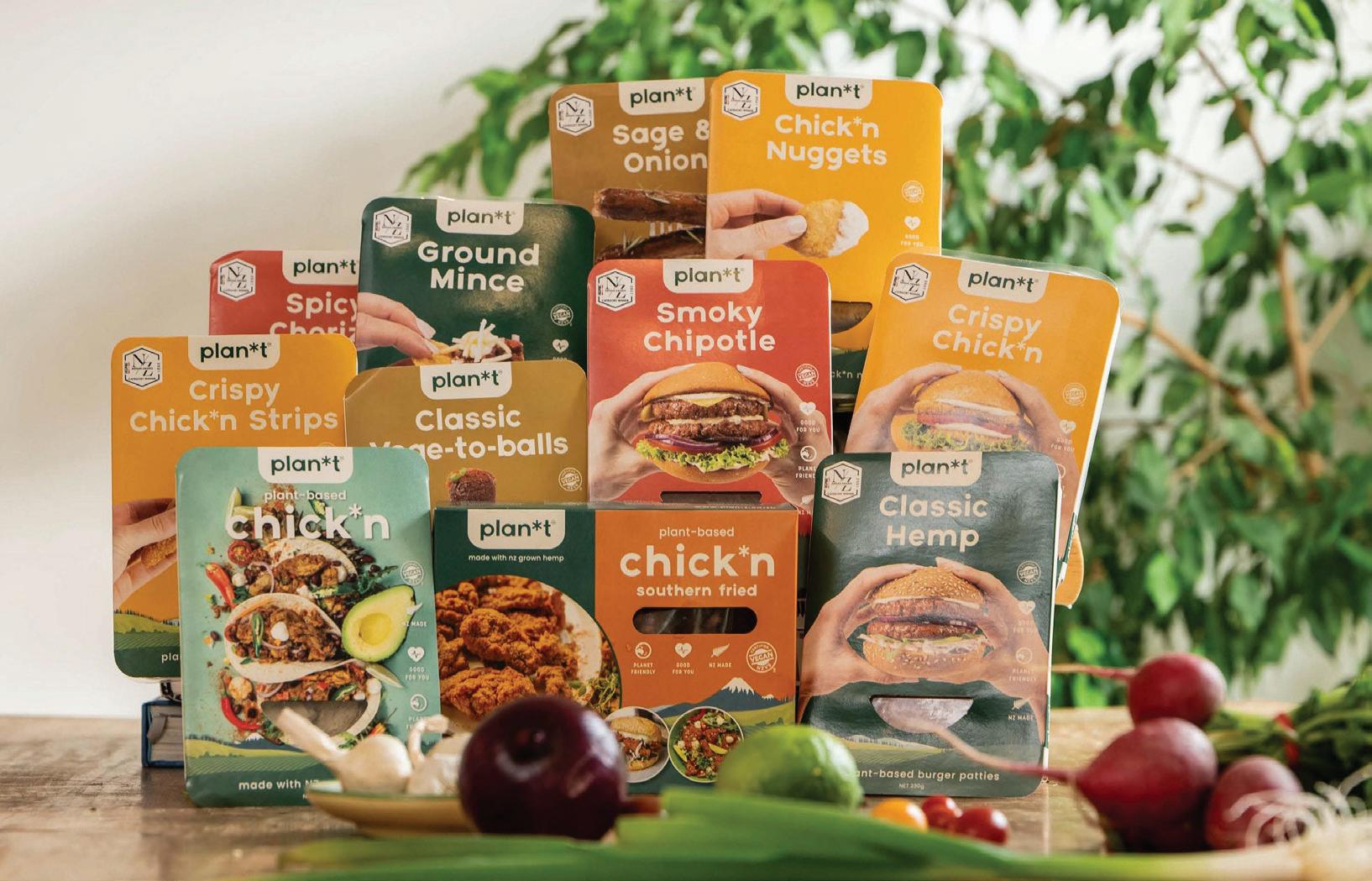
& Onion, and Spicy Chorizo flavours, and burger paddies in Smokey Chipotle, Classic Hemp, and Crispy Chick*n flavours.
Brand ambassador TJ Perenara shared that he wanted to be part of a project that enabled him to make an impact.
People seem to think that moving to a plant-based diet means all traditional foods are off limits, but it’s not the case – with plan*t, you don’t need to miss out on anything,” said Perenara.
With over 1.5 million New Zealanders eating less meat, plan*t’s protein-rich and varied plant-based product range is suited to consumers searching for health-focused, environmentally friendly proteins that can support an active lifestyle while eating less meat.
With a range of wins across flavours and innovative awards, plan*t also seeks to minimise its environmental impact through various factors, including recyclable packaging materials and local ingredient sourcing using plant-based food technology in New Zealand. n

Part of the plan*t business model is its field-to-plate approach, where the company has mindfulness of the environmental impacts of its ingredient sourcing across its production, packaging, ecosystem, and partnerships.
Vegetarian roast with all the flavour of a traditional Sunday lunch with less saturated fat. Nothing brings people together like a classic roast dinner, cater for everyone with our meat-free alternatives.

Wade Vuletich, Monde Nissin New Zealand wade.vuletich@mondenissin.com n




Tempeh Deli has a range of award-winning tempeh traditionally made in New Zealand from local and sustainable grown organic lupins.

It is a wholesome plant-based product packed with protein, dietary fibre and flavour.
Tempeh Deli’s wholesome white lupin tempeh is an excellent alternative to soybean products and other highly processed plant-based products.
The company’s range includes flavours Original, Mediterranean, Seaweed Tamari, Savoury Mince, and BBQ Burger.
Each product is conveniently pre-marinated with a fine blend of natural herbs and spices, our tempeh can be used in a range of dishes.
Every pack serves two, and all are free of preservatives and gluten.
For more information, please visit www.tempehdeli.co.nz. n
Flip Grater is the awardwinning Christchurch restaurant owner and cookbook author behind Grater Goods. Grater Goods is New Zealand's first-tomarket plant-based deli and charcuterie range in the chilled deli meats aisle.
Grater Goods has committed itself to craft carefully curated, delicious plant-based products for food lovers without compromising environmental ethics.

Available now in a convenient sliced format, Grater Goods Plant Pastrami is a sweet, smokey, and spiced 'corned beef' style meat alternative. Perfect to be used as a vegan New York Reuben, it can be eaten alone on platters or added to dishes as a beef substitute. Grater Goods pastrami is sweetened using beetroot and allnatural ingredients and can be eaten hot or cold.
Flexitarians, meat reducers, vegetarians and vegans can look forward to Grater Goods range expanding as it welcomes three new variants to the charcuterie range. Sliced Pepperoni, Sliced Chicken and Chorizo Sausage are category firsts and perfect for sandwiches, pizza toppings, soups, pasta, and grazing boards.
Grater Goods Plant Pastrami 100g is available nationwide at New World, PAK'nSAVE, Moore Wilson, Supervalue, and Fresh Choice. n
The co-founder of Vince, Debbie Stowe, revealed that the creation of the vegetable mince company began with Stowe searching for a way to change her family’s eating habits as her daughter experienced ongoing issues with eczema.

Following the sale of her cafe, Stowe began considering a new business venture. The inspiration behind Vince stemmed from Stowe noticing parents around her struggling to prepare healthy meals for their families.
As a chef herself, Stowe began experimenting with ways to include more vegetables into meals in an effort to make a positive impact and improve health outcomes.
Vince is a meal-ready solution crafted from New Zealand-grown vegetables, minimally processed with no fillers or preservatives, and has a shelf-life of 18 months. Stowe revealed that at Vince, vegetables are gently air-dried to maintain flavour, and the product itself is easy to prepare by simply adding boiling water.
The vegetable mince comes in three
varieties to suit a range of family favourites, including Mexican, Italian, and Kiwi, which has a traditional savoury flavour similar to cottage pie.
Stowe shared that the key feature of Vince was its versatility as a vegetarian alternative.
“We see most customers blending it with beef mince, using it as a cost-effective, nutrient booster in everyday meals. Parents have been grating and blending veggies for years,” stated Stowe.
Rich in vitamins, with a low-carbon footprint, Vince vegetable mince contain high levels of fibre and has significant protein sourced from its vegetables and high-oleic peanuts.


Stowe stated that consumer trust in plantbased products had dwindled, with consumers becoming more knowledgeable and realising that plant-based does not automatically mean that products are inherently healthier.
“We see people wanting to cut back, but not eliminate meat from their diets. And they are doing it for their health. With these drivers, it makes no sense to choose an overly processed alternative without any health benefits.”
Stowe explained that early versions of plant-based products heavily relied on highly processed textured vegetable proteins to create plant-based alternatives that mimic traditional textures. This is a feature of plant-based products that have turned consumers away, said Stowe.
“We use peanuts instead of isolated protein
as it is a whole food and gives good flavour and protein to our recipe.”
Stowe was determined to create whole food products that used common vegetables that were easily sourced and New Zealand grown, to lessen supply chain risks while simultaneously supporting New Zealand businesses.
The co-founder and chef stated that Vince was modelled to meet customers where they were on their food journey and to provide a healthy option to support customers incorporating more vegetables into their diets, while also reducing meat intake.
Vince has prioritised engaging directly with growers and food rescue services to make a sustainable company model which is both scalable and profitable. Stowe stated that the company aims to be B Corp certified, which is reflected in the company’s low-energy, lowtemperature drying solutions for vegetables, which are operated from solar power and have similarities to a traditional sun drying process.
Stowe revealed that the company is working toward creating plant-based butter and chicken alternatives that are neutral and can be used for any meal. The Co-Owner revealed that her favourite Vicne product was the Italian Vince, served over pasta with a generous portion of parmesan and a dollop of plant-based sour cream. n
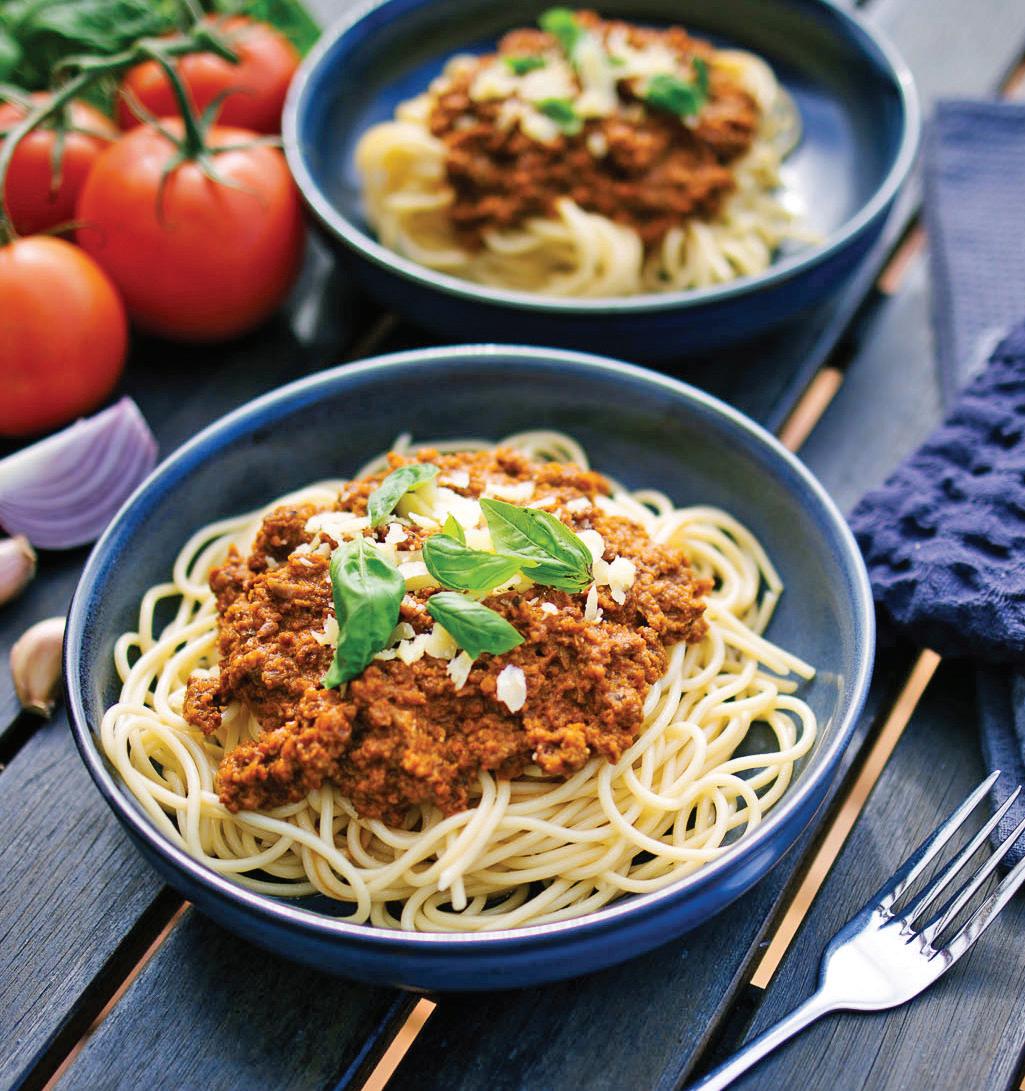
Annies, the family-owned fruit snack business, started in 1986 when Graeme Giles gave his partner Annie a small harvest maid dehydrator as a wedding present. The Giles family has farmed the Radford property with various crops and fruits (apart from tropical) for 130 years.

With a surplus of fruit from their Highway One Vegetable Market, Annie began converting apples, strawberries, and plums, into fruit rolls for sale in the couple's shop using the new dehydrator.
The pair made 1000 thousand rolls in the first year and 5000 in the second.
“It was great backup during our early farming days with 28 percent interest and removal of subsidies,” shared Graeme.
The business grew debt-free for 15 years as the pair dried and packed three million bars in their cottage factory of 12 staff.
New Zealand supermarkets were on board, with Australia’s supermarkets Coles and Woolworths following quickly behind. In 2005 the Giles couple committed to buying a new 2000 square metre production facility, which coincided with an interest in Annies from the major U.S.A company, Trader Joe's, by an extension of Aldi Germany.
Giles's first order of eight million bars was a challenge to produce. However, Graeme shared that the sales. The pair regularly supplied 18 million in two years, where Annies had established markets in Germany, the United Kingdom and France. The company’s drying capacity grew to 3000 tonnes of puree annually.
“The business was strong and supported the low grape prices in our farming package for two years in early 2011 and 2012. We were improving the systems continually and automating where possible.”
Graeme revealed that, late in 2012, the Annies’ management team had changed private label packaging without the awareness of its implications, resulting in Trader Joe’s withdrawing the Annies product from its shelves. While the company had strong structures, the Giles family couldn’t sustain the resulting cash-flow impact.
“In the resulting receivership, Annies was sold to the Nelson Iwi Wakatu.”
Graeme shared that the Iwi’s food division, Kono Foods bought the business in 2013, and within eight months, Trader Joe’s came back on board.
Kono Foods have maintained equipment, markets, and systems for the last ten years to keep the brand active in New Zealand and overseas markets. With significant interests, and a need to rationalise, the Iwi closed Annies in December 2022, leaving a void and shock in the market.
Graeme stated that as the owners of the factory building, and the brand's history, the Giles family felt they could not walk away. As a result, the Giles family negotiated a purchase of all equipment, brand and intellectual property. Annies were back in the original ownership.
“We are extremely passionate about the brand and the ongoing potential for the simple natural fruit bars with no additives and no allergenic properties.”
Annies fruit snacks are great for kids, and adults, who are health conscious and cater to those with gluten or nut allergies and sensitivities. Supermarkets have supported Annies and its continuation, and other parallel markets are ongoing.
The new generation of Annies’ owners includes Annie and Graeme’s daughter Cabie, her partner Dan, and the
grandchildren, Thomas and Freya.
Graeme stated that the children would be the face of the brand, with Annie’s support in the background. The passion to retain and grow the brand is foremost with six generations on the property. However, spreading the load is always essential.
The Giles family shared that they are excited to have Ant Moore (Ant Moore Wines ) and his family join the Giles family as partners.
The brand's strength and simplicity allow Giles to branch into other value-added natural food products. Graeme reveals that the brand already had several exciting projects, including variants with HiFi Wheat Fibre, pre and probiotics, and protein.
Annies are also working with innovative food developers in the Hemp Industry.
The Giles family will take over the business in the next few weeks, with Kono continuing to supply Supermarket channels with finished goods until the end of July.
For any queries or information, please contact Graeme, Annie Giles, and the new generation team at Annies 02 1910 484. n
We are extremely passionate about the brand and the ongoing potential for the simple natural fruit bars with no additives and no allergenic properties.
Extreme weather events such as Cyclone Gabrielle may have disrupted the supply chain for Feijoas, but the fruit has remained in relatively good shape in the face of the last few weeks.
The slow start to the fruits 2023 season is going on an uphill trajectory, with the New Zealand Feijoa Growers Association (NZFGA) manager, Ian Turk, stating the impacts of the Cyclone have been less devastating for the fruit than for other fresh produce.
“The weather has impacted feijoa orchards in the top half of the North Island. However, they appear to have escaped significant damage to both the plantings and the structures,” stated Turk.
Grown commercially from Northland to the top of the South Island, the fruits have a large geographical area within which it grows, which could be attributed to the minor impact on the feijoa following the devastating weather.
The weather appears only to have delayed the supply of feijoas from the Northland area, typically distributed in March. However, now it's expected in April.
“This year NZFGA are estimating harvest volumes of around 1200 tonnes, produced by 120 growers nationwide. That’s a good result following a couple of tough seasons

with challenges ranging from weather disruptions to labour shortages and a global pandemic.”
These delays in supply will maintain a more affordable price point as the seasons change. The most adverse impact of the weather conditions is on the fruit's skin. However, Turk stated that the flavour would not be compromised.
There may be a slight decrease in volume, but the reduction is not significant enough for the industry to expect any lack of supply to meet demand. As a highly perishable fruit, stores must store and display it to maintain its quality and freshness.

Storing feijoas at four degrees Celsius is the optimum after purchasing, and they should not be displayed for at most two or three days out of refrigeration.

As a highly nutritious fruit, Turk shared the reminder that feijoas are a healthy incorporation of a 5+ A Day diet.
“Including just two feijoas in your diet each day through the autumn months will provide 64 percent of the recommended daily vitamin C intake, which has an important role in increasing immunity.” n
BUSINESSFUNDINGRESOURCE RECOVERY&RECYCLING
Deliveringcomprehensiveproductstewardshipsolutionsin partnershipwithindustry,andlocalandcentralgovernment. Ourschemesinclude:
Creatingacircular economyturning oursoftplastic wasteinto consumable products
Increasing recoveryof containerglass andimproving recyclability
Investingin resourcerecovery; increasing recyclingand reducinglitter
Leadingthe co-designofa schemeforNew Zealandthatwill transformhowwe useandrecycle plasticpackaging
Brand Manager at Alchemy, Sophie Roberts, revealed that with each new product development, the company always explored packaging which would help reduce the company's overall environmental footprint.
For Alchemy & Tonic, it was critical that our packaging portrayed the sense of magic that the brand embodies,” revealed Roberts.
However, Roberts also revealed that standing out was essential in the competitive beverage market. Therefore, Alchemy & Tonic translated its charm into its packaging by using unique colours and artwork in playful and unexpected formats, such as the brand’s 250ml cans and new bespoke 600 ml glass bottle, both of which Roberts commented were recyclable.
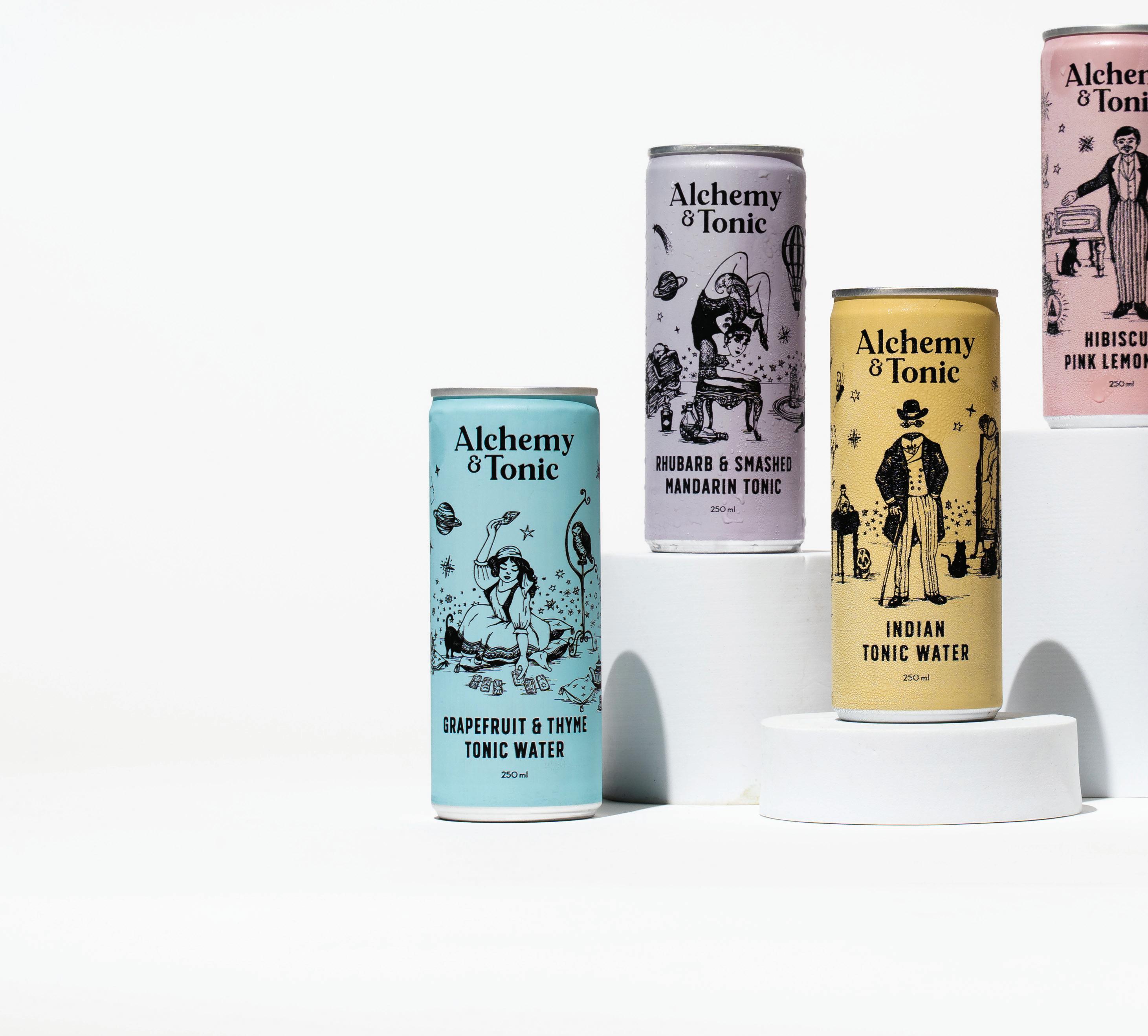
Roberts shared that at Alchemy & Tonic, there was a talented in-house design team. However, the company worked with a range of talented individuals. With a unilateral desire for distinctive design, the team worked alongside Brave, a renowned and talented local artist known as Kallola Brown.
“The brief was to create a series of characters to bring to life our tonics under the theme of ‘magic’.”
Roberts revealed that Brown self-described that her inspiration for the Alchemy and Tonic illustrations was from a converging of themes, such as transformation, illusion, sorcery and astrology.
Inspiration was drawn heavily from the Victorian Era, a golden age for the mystical
arts and characters such as the invisible man, oracles, and contortionists, which captured and cultivated the imagination of many. These features were blended into individual scenes depicted on Alchemy & Tonic's new range, ensuring each drink had a throughline of magic that made each drink unique.
Design is of utmost importance at Alchemy & Tonic, with Roberts revealing that the brand packaging is designed to tell a story aligned with the consumer desire for quality products that are sustainably packaged with recyclable material also reveals a unique story.
“Design is important to us, and we wanted our packaging to tell a story. Not only do consumers look for a quality product, but they also want to know it’s made from recyclable materials, is sustainable and looks good not only on the shelf but when they are consuming it.”
Roberts elaborated that the brand’s choice to have its mixers packaged into cans and glass was specific to both materials being the most recyclable packaging options in New Zealand. She shared that over 18 months were spent creating a bottle design that used lightweight glass, at minimum, 70 percent of which was recycled glass, making it cheaper and more efficient to move around the country. The glass is locally made through
Visy, which diverts 521,000 tonnes of glass from a landfill yearly.
“We consciously chose to use paper labels on our bottles instead of plastic-based labels. In addition, all of our outer cartons are made from FSC-approved paper sources, along with a high percentage of recycled cardboard.” All of these choices by Alchemy & Tonic are deliberate for the company to reduce its carbon footprint.

With the brand's recent glass bottle launch, Alchemy & Tonic is actively pursuing avenues to create a bottle-swap programme to reuse its bottles. However, this venture is still in its infancy, with the company’s long-term goal of creating a circular economy.
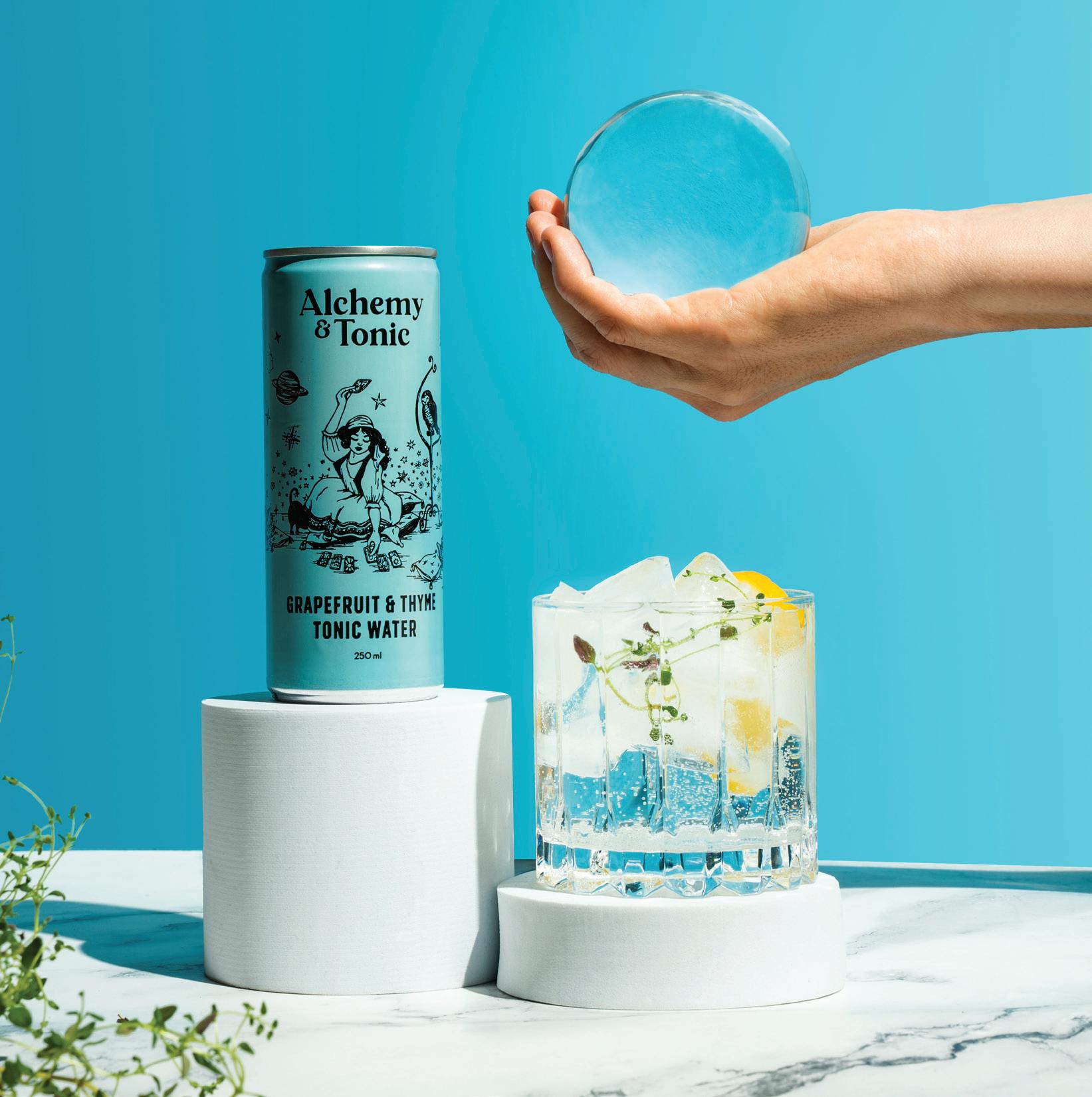
Roberts described the design process as beginning with research into the company’s target audience, garnering knowledge of market opportunity.
“We also look at trends in packaging design and competitors to come up with a look and feel that has shelf standout.”




Pastel colours and magical scenes were utilised in the new range in alignment with the brand’s personality. Alchemy & Tonic’s research process has allowed the company to develop a brand that would stand out in a crowded market and resonate with customers. n
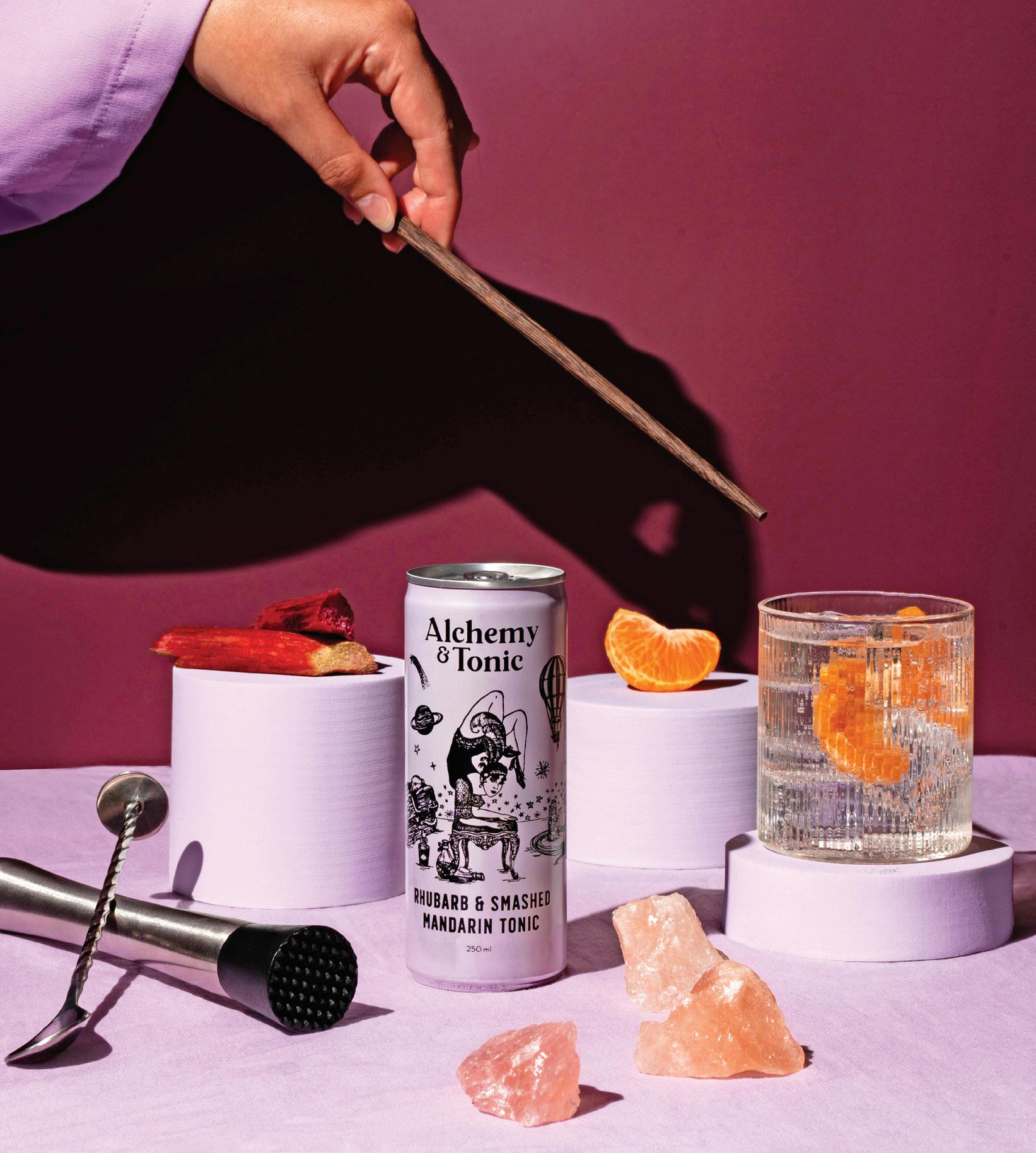
Growing concerns around plastic packaging and its environmental impact have driven manufacturers and consumers to opt for sustainable packaging options. The conscious consumer is increasingly making decisions based on their carbon footprint and the carbon footprint of the products they buy and consume.
These concerns regarding environmentalism have driven packaging innovations, with market trends revealing that consumers pay closer attention and tend to choose products packaged in recyclable or compostable materials. New data indicated that 68 percent of consumers had chosen a product in the last six months based on its sustainability credentials.
With this drive for sustainable and circular materials, innovation within the packaging sector has grown, with several materials being innovated to meet consumer demand. Materials included within this innovation include paper, glass, and biodegradable materials like starch to soft recyclable or recycled plastics.

Insights revealed that the paper packaging market is estimated to be valued at USD
3,83,867.8 million by the end of 2023. The key factors driving growth for the material are its versatility, flexibility, and cost efficiency. The market opportunity for paper packaging is expected to expand at astonishing rates, with a predicted compound annual growth rate of 4.1 percent over the next decade.
Global companies are experimenting with paper packaging, and with the launch of 100 percent water-resistant paper packaging, the usability of the material has only grown.
Biodegradable materials such as cassava roots and cornstarch are another route manufacturers are taking to address and meet consumer concerns over the use of the sustainability and environmentalism of their product choices. From tea bags to singleuse utensils, biodegradable materials have become an appealing area of innovation, aligning with consumers' trends towards choosing products that align with their values.
Consumers have become more knowledgeable and direct in deciding which grocery items they purchase. Key trends driving these decisions are related to how brands market their products. According to several studies, consumers preferred products that had smarter waste reduction techniques, such as the removal of excessive use of multiple layers of plastic packaging wrapped around products.
Another preferred packaging feature was products designed for reusability, minimising
personal waste for consumers, and with refill and return options, creating a circular economy. Studies revealed that 74 percent of consumers would be interested in buying products that come in refillable packaging.
Bio-based and biodegradable materials are areas affluent for innovation, with consumers attracted to products that can be returned to the soil and the environment without worrying about the recycling specification that needs to be followed for other materials to be considered sustainable.
Designing for longevity is another feature consumers tend towards, product packaging which can be reused and maintain quality for consumer use over their lifetime.
Not only are consumers making decisions based on the product's sustainability features, they are also willing to spend more for sustainable products.
This is particularly true for younger generations, with new data revealing that 86 percent of consumers (under 45) are willing to pay more for sustainable products and 57 percent of consumers stating they are “less likely” to buy products in harmful packaging. n
process increases as it requires no additional labour or equipment to create.


Tomane stated that sustainability was a movement, not a trend and that the brand was committed to creating an eco-friendly solution whilst there was consumer demand for a scoop.
“Small changes can still make a tangible benefit to the environment.”


Going on further, Tomane shared that sharing knowledge and collaboration could be incredibly powerful for the industry as a whole to come together to create potential solutions with a unified goal.
Earthwise’s practices differ from traditional scoops provided in laundry powder, which are fully formed as a separate product crafted from plastic or board. The Head of Marketing shared that these traditional scoops required extra packaging and processing steps and could create further waste.

Extra processing has the potential of requiring additional labour or equipment to physically add the scoop into laundry powder boxes, which is a design challenge that Earthwise wanted to address directly.
“The design challenge for us was to create a scoop that was an integral part of the existing unit carton, optimise the use of existing unit carton board sheet and avoid additional cost.”
Kerry Tomane, the Head of Marketing at Earthwise, shared that convenience was a key driver of laundry market purchasing as consumers see little difference between brands and products. If other brands present additional benefits or convenience, consumers will switch what brand they use products from.
Tomane shared that sustainability was at the heart of everything Earthwise does, and addressing consumer demand for a laundry scoop while being eco-friendly was imperative.
Earthwise’s eco-laundry scoop is a first of its kind, structured as a flat cardboard design. It is incorporated into the dieline of the existing laundry box, where consumers tear along the perforation and self-assemble the scoop in three easy steps printed on it. The scoop has a volume capacity of 30 grams, which measures a standard powder dosage and is 100 percent recyclable.
Tomane described Earthwise’s packaging philosophy as reflective of the Earthwise Group’s pledged support to the New Zealand Packaging Declaration, which has meant that the company has committed to having 100 percent of its recyclable, reusable packaging or compostable by 2025.
“Since October 2018, Earthwise has reused and diverted over 950 Tonnes of plastic from landfills since using at least 75 percent recycled plastic content in bottles.”
The brand’s carton packaging was already 100 percent recyclable, crafted from PEFC board, with the new laundry scoop fitting in perfectly with Earthwise’s existing product and packaging ethos.
The new scoop further demonstrated Earthwise’s commitment to sustainability, national targets, and adherence to sustainable packaging guidelines through its reduction of unnecessary use of plastic. Its 100 percent recyclability has zero increase on the product's carbon footprint and does not
This required the team to innovate, and by working closely with its packaging supplier, Forbes Packaging, Earthwise was able to come up with its current solution.
Earthwise has committed itself to looking at new projects each year that reduce water, energy consumption, and waste production as an Environmental Choice Certified (ECNZ) company, which is New Zealand’s highest eco-friendly accreditation. Measuring its energy and water consumption is completed annually as part of this certification.
The Head of Marketing exclusively revealed that Earthwise would be removing the resealable bag in its Dish Tablets, a venture that has taken extensive product and packaging trials to achieve.
When discussing the global plastic pollution crisis, Tomane shared that the most significant challenges companies such as Earthwise face in addressing the problem are related to cost-effectively achieving scale. Tomane explained that investment is required from numerous companies to increase supply and drive down costs.
“Incorporating recycled content in packaging is a step towards this, but we only moved to this after rigorous testing to ensure the bottle still did do its job.”
Tomane emphasised that sustainability was a journey, not an end goal. With that central to Earthwise’s philosophy, the company is consistently and continually searching and implementing ways to improve its carbon footprint. Working with and supporting existing regional and national recycling schemes is essential when improving the recycling infrastructure. n
Countdown has shared that an essential part of its sustainability work was reducing unnecessary plastic and packaging across the business. While a representative for Countdown has stated that the enterprise has made good progress, Countdown emphasised its knowledge of the need for much more to be done to meet both its customer's aspirations and its own.
As part of its Sustainability Plan, Countdown is working to transition its brand products to recyclable or reusable packaging and exit problematic packaging by 2025. Key highlights from the past 18 months include the rolling out of meat trays without soaker pads in the North Island, which has eliminated the use of 90 tonnes of plastic.
Secondly, the company has introduced 1.5-litre recyclable soft plastic drink bottles, removing 80 tonnes of virgin plastic. Thirdly, Countdown’s two-litre ice cream tubs have been repackaged in a light-coloured polypropylene diverting 121 tonnes of plastic from landfill and making them recyclable.
Finally, Countdown launched a first-tomarket recyclable ready-meal tray, equating to 7.5 tonnes of plastic that would
otherwise have gone to the landfill, which now can be recycled.
Countdown does not use compostable or biodegradable plastic packaging in its own brand packaging, aligned with the Ministry for the Environment’s position and advice from the Food and Grocery Council Sustainability Committee.
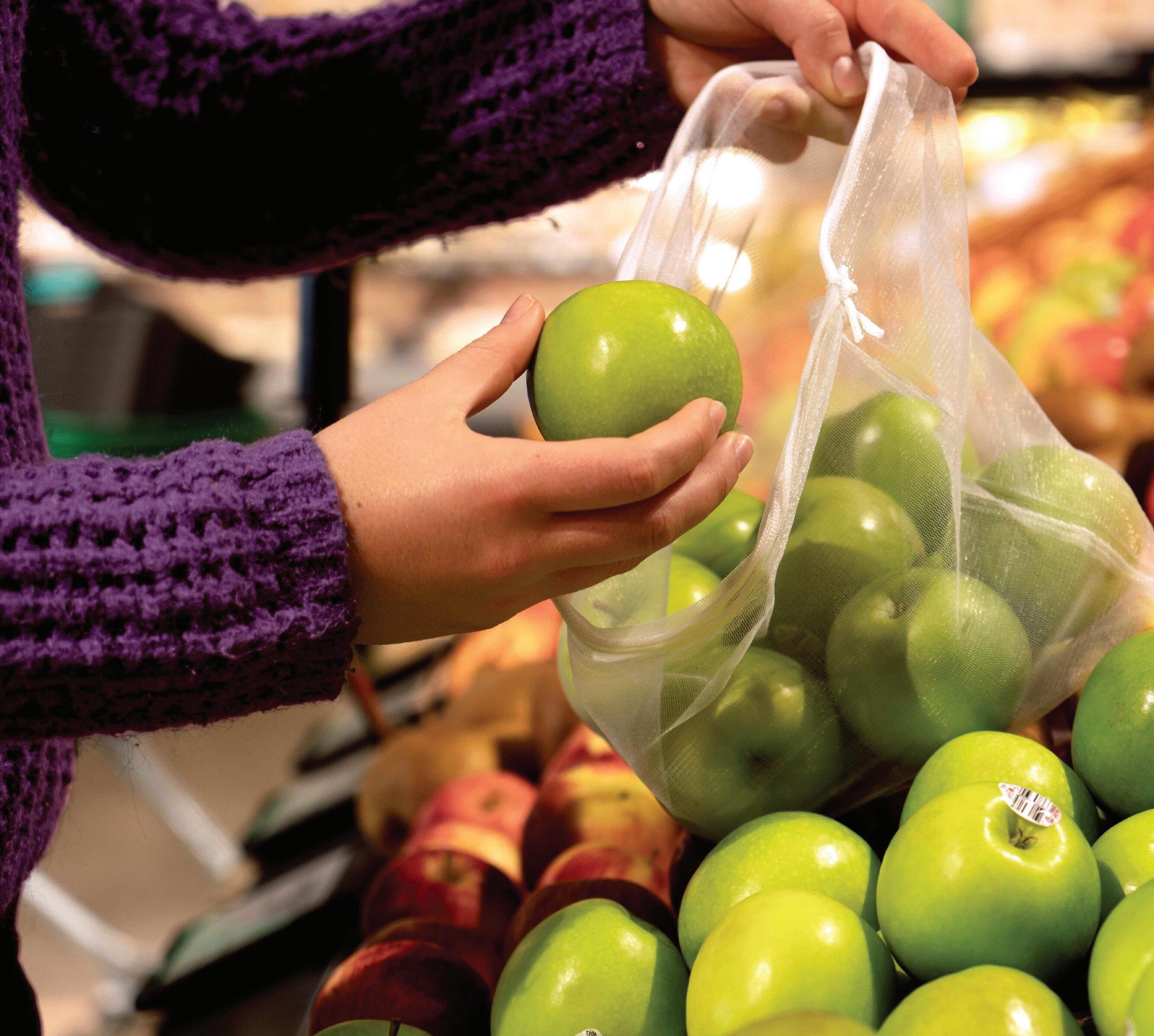
A spokesperson for Coutndown reiterated that the company knows that the company must look past its own brand products. Therefore, Countdown has developed guidance for its vendor brands that utilises a traffic light system to grade packaging materials for recyclability in New Zealand.
The traffic light system would show which materials are preferred, which should be used sparingly, and which should be avoided and phased out by 2025. This guidance is integral to Countdown’s
communication with its vendor brands.




Countdown has become the first New Zealand supermarket to roll out an easyto-identify on-pack recycling label, the Australasian Recycling Label (ARL). This is to make products that align with consumers recycling intentions easy to identify.
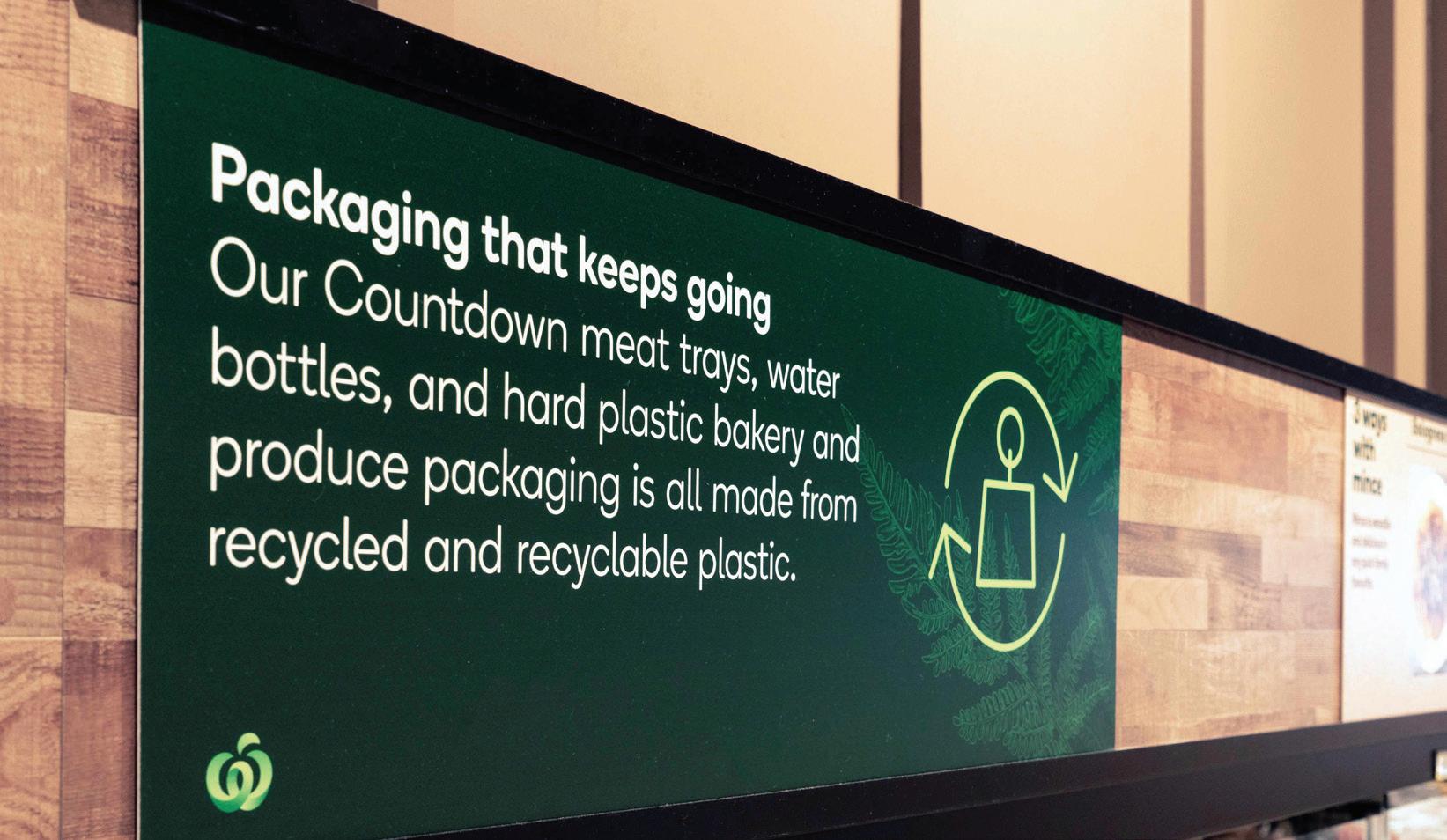

The ARL is an evidence-based system that provides easy-to-understand recycling information. Each label will tell customers how to best recycle or dispose of each type of packaging item. This label was on 55 percent of Countdown branded products in June 2022, and the company has the target of it being on 100 percent of its products by the end of the year.
Countdown’s carbon footprint has reduced its carbon emissions by 46 percent in a 2022 overview compared to its emissions baseline from 2015.
This was the result of concerted effort and investment, with a focus on its instore refrigeration systems. Through our investment in refrigeration systems, we have upgraded or retrofitted over 130 of our stores since 2017.
Countdown has significantly reduced refrigeration emissions, moving its focus more squarely onto transport decarbonisation. For its online delivery trucks, Countdown is looking to build on its pilot of five EV trucks, which joined the fleet in 2019, with the support of a grant from EECA (Energy Efficiency and Conservation Authority).
The Sustainability Consortium developed the THESIS platform, which is used by several other food retailers globally. Regarding the production and distribution of its products, Countdown engaged 13 of its most material vendor brands in a
programme to report their emissions using the THESIS platform in 2022. Currently, the enterprise is reviewing supplier results, intending to expand the programme.
The enterprise regularly engages with its suppliers, customers and other stakeholders on its supply chain sustainability work across several different channels.
Countdown recently released our 2022 Sustainability Wrap detailing our progress towards our sustainability commitments, accounting for over 40 ambitious commitments the enterprise wants to meet by 2025. n

Countdown has become the first New Zealand supermarket to roll out an easy-toidentify on-pack recycling label,
Rai Bostock, the Global Marketing Manager for Lo Bros, revealed that the company was dedicated to using the best available packaging solutions that are simultaneously fit for purpose and are environmentally conscious.
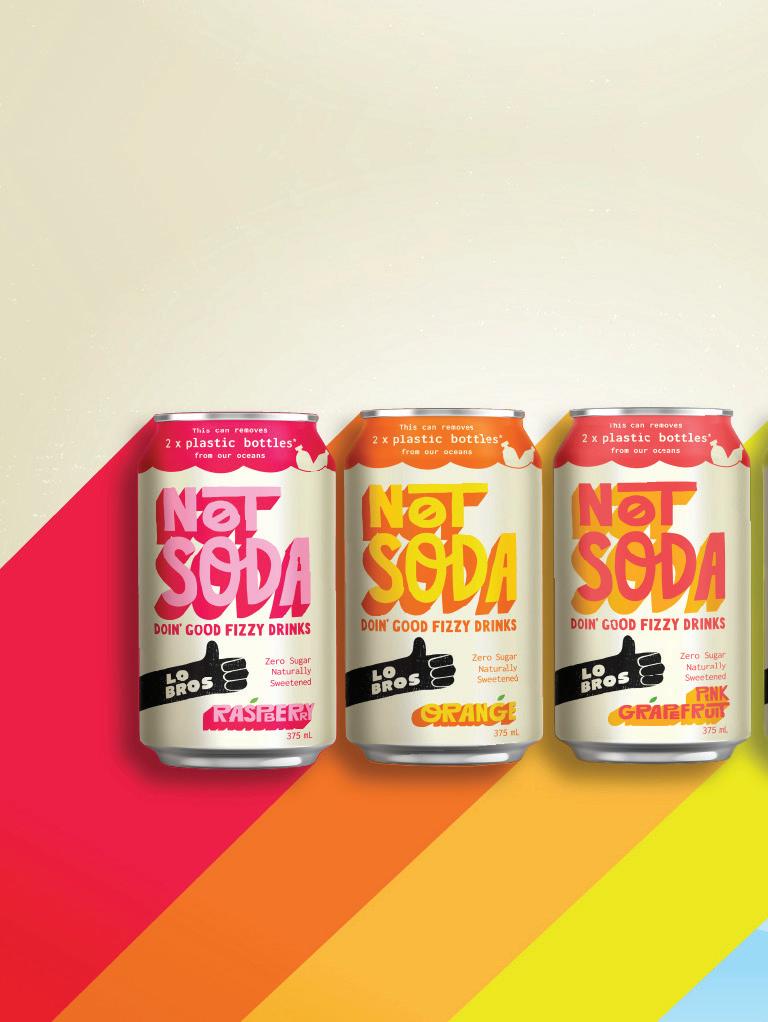
Committed to using only glass or aluminium for its beverages, Lo Bros acknowledged that each material has benefits and drawbacks. However, Bostock shared that the choice to use glass and aluminium was centred around the materials being the most efficient to recycle, with the highest recovery rates.
"We know we are not perfect, and we do use some plastic where it is unavoidable. However, to reduce our impact, we partnered with Plastic Collective, who recently audited all plastic usage globally across the Lo Bros brand."
To further offset unavoidable plastic use Lo Bros also supports the Plastic Collective's recovery program, with these efforts making Lo Bros a Net Zero Plastic Accredited brand.
When creating product designs, Lo Bros outsources and has an internal graphic designer who works closely on all design execution. Bostock stated that Lo Bros often partners with design agencies regarding larger projects and new brand and product launches.
For Lo Bros' new product, Not Soda, the company partnered with Studio Ramp, a creative team based in Melbourne.
Bostock shared that over the last decade, product design has evolved into a mode of storytelling of brands, reflecting its values and ethos. The plan for the Lo Bros Not Soda was centred around creating something unique, with the underlying purpose of communicating a story through its visual identity and packaging.
The Global Marketing Manager stated that the challenge was to stop consumers and have them look at the Not Soda product. Naming the beverage Not Soda was a strategic choice, a polarising name that reflected that Lo Bros were not part of the soft drink industry problem while still being a sweet, natural, fizzy drink.
Not Soda was positioned as a drink that was 'Doin' Good' for both the consumer and the planet, removing the connotations between sugar and plastic waste through direct and clear copy and hierarchy.

With Lo Bros being a global company, Bostock stated that it needed to minimise its carbon footprint where possible. This has led to the brand deciding to produce locally in its three primary markets, New Zealand, Australia, and the United Kingdom. Lo Bros can locally manufacture and procure ingredients to minimise its environmental impact by producing locally in these markets.
The Lo Bros Not Soda product also directly addresses the impacts of the soft drink industry through its partnership with Seven Clean Seas. With every can of Lo Bros Not Soda sold, the company funds the removal of the equivalent weight in plastic bottles from oceans and waterways.
Bostock described the partnership as one of which Lo Bros is very proud, having already removed the equivalent weight of over 500,000 plastic bottles in only six months from Not Soda sales in New Zealand alone.
When assessing colour brand development and design, Lo Bros believed that the company needed to be proactive about crucial issues in the soft drink industry for its Not Soda product. To do this, Lo Bros created its Not Soda range with brightness to highlight optimism and for the products to stand out on the shelf. The Not Soda range's block types and colour combinations are designed to be fun, accessible, and nostalgic for lovers of old-school soda.
"Not Soda letterforms jump out as a call to action, and a floating water line at the top of the can highlights the problem and empowering solution."


Bostock emphasised that the design was not created to be preachy or guilt-driven, only to reflect a humble little drink allowing consumers the choice to be healthier and help clean polluted waterways and oceans through every purchase.
Currently, Lo Bros are working on a plastic reduction initiative across its primary and secondary packaging, including innovating its kombucha labels on its glass bottles to a paper substrate, which removes a gram of plastic per label. n


Ecostore has recently launched its new 3X Concentrates Laundry Liquid, the new packaging design centred around the brand’s commitment to sustainability and reducing its environmental impact.
The new design contained 55 percent less plastic and water than the brand’s regular laundry liquids. APCO (Australian Packaging Covenant Organisation) approved both pump and bottle, making the new product fully recyclable while maintaining and delivering a powerful performance. With the new design of the three pumps method, the laundry concentrate makes it easy application without mess. CEO of Ecostore, Pablo Kraus, stated that the new smaller and more convenient bottle saves shelf space at home and in the supermarket all while providing the same number of washes as the brand’s larger mainstream products.

“Our new design aligns with our brand purpose. A world where safe, sustainable, ethical products are the norm,” shared Kraus.
Kraus stated that Ecostore’s packaging design choices are centred around the company’s planet-before-profit philosophy.
Ecostore’s packaging design choices are aligned with the company’s incentive to prioritise sustainability, safety, and simplicity, which has been an ongoing theme of Ecostore’s intention with its products since 1993.
Kraus revealed that the brand’s plastic bottles are created with a mix of sugar plastic, a material the company transitioned to in 2014, which he said was before the increased
trend of utilising locally sourced plastic. The brand’s new 3X Concentrates Laundry Liquid also reflects this environmental consciousness.
“We are committed to using renewable, recyclable, and refillable packaging for our products whilst eliminating as much unnecessary packaging as possible.”
Certified by the Forest Steward Council, the cardboard packaging of the laundry liquid was created to promote environmentally appropriate, socially beneficial, and economically viable management of the world’s forests.
Kraus shared that the company uses sugar plastic instead of petrochemicals to capture CO2 from the atmosphere rather than release it. Secondly, the Ecostore incorporation of recycled materials creates a circular economy, reducing the need for new plastic.
Ecostore’s combination of plastic made from sugar and recycled materials has enabled the brand to create durable bottles which require less energy and resources for production and minimise the amount of plastic in our environment.
Kraus revealed that Ecostore had saved over 7,676 tonnes of carbon from being released into the atmosphere, the equivalent of driving a car from Cape Reinga to Bluff 14,610 times.
“Our sugar plastic bottles are 100 percent recyclable through kerbside collection and can be remade into new bottles. And whilst recycling is excellent, refilling is an even better option which ecostore offers in many supermarkets and stores across Aotearoa.”
Furthermore, Ecostore utilises minimalist designs that are simple, clear, and easy for consumers to understand to reflect the brand’s transparency about what is contained in its products to support consumers in making informed decisions when purchasing.
Kraus shared that Ecostore also provides and encourages consumers to refill their used products, with the company having over 90 refill stations around New Zealand.
Ecostore’s commitment to sustainability and the environment has earned the company certifications from Toitū Net Carbonzero and Enviro-Mark Diamond, which the Kraus stated set the company apart.
In addition to the 3X Concentrates Laundry Liquids’ eco-friendly packaging, design, and easy application, Kraus shared that Ecostore was proud to use gentle plantbased ingredients on fabrics while removing dirt and stains.

“Our formula is free from harsh chemicals like phosphates, synthetic dyes, and optical brighteners, making it a safer and more sustainable choice for customers and the environment.”
As B Corp-certified organisation, Kraus shared that Ecostore was one of the first companies to go carbon-neutral in


Australasia. The company have installed solar panels on the roof of its Auckland manufacturing facility, generating enough energy to power the site and feed surplus electricity back into the grid. The company sources locally wherever possible and uses various techniques to reduce energy usage in its manufacturing process.
Furthermore, the company offsets its carbon emissions by using renewable energy and being involved with native forest programs. As well as this, the company has established its Plastic Return Program, which remakes its empty packaging bottles, reducing the new for new plastic production.
In its first year, the Plastic Return Program collected 4,600 kilograms of plastic, equivalent to around 83,600 500-millilitre dishwashing liquid bottles. Of this plastic, 72 percent has been recycled into new bottles, and the remaining 28 percent will be sorted, cleaned, and reground.
The company’s refill stations have meant that Ecostore has saved the equivalent of 275,693 1-litre containers in 2019 and has continued to expand its refill locations into its global markets.
“We constantly seek new ways to minimise our environmental impact and improve sustainability across all business areas.”


Kraus revealed that the company aims to reach carbon negativity by 2025, which it plans to achieve by reducing its carbon footprint across production and distribution, investing in renewable energy sources, and offsetting any remaining emissions through carbon credits.
The CEO said that Ecostore believed that education about sustainability was imperative to creating a sustainable future and would continue to be a critical part of the company’s mission.
“Businesses have a responsibility to prioritise sustainability. By adopting sustainable practices, businesses have the potential to drive growth and engage with consumers who are looking for companies to take a more proactive stance on environmental issues.”
Kraus emphasised that sustainability was something that both businesses and consumers needed to work together on, as addressing the challenges of environmentalism will create new opportunities for growth and profitability while taking care of the planet.
“We are proud to be leaders in sustainable business practices, and we hope to inspire other companies to join us on this journey.” n
Our new design aligns with our brand purpose. A world where safe, sustainable, ethical products are the norm.
SIAL


MIFB is the future of food business, offering a platform for businesses from the industry to showcase their products and services to leading buyers from the region.




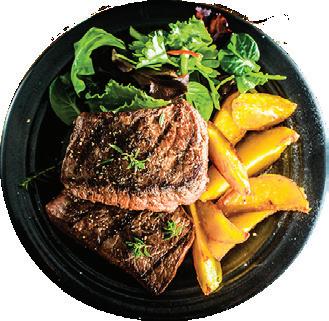




We’re excited to announce the Peter Mitchell Memorial Golf Day, where we’ll be teaming up with the Graeme Dingle Foundation to raise funds for Kiwi Can and the amazing Peter Mitchell Scholarship. This scholarship is perfect for anyone looking to further their knowledge and training in FMCG, fashion, and hospitality. Peter Mitchell was an industry legend who received the FGC Lifetime Achievement Award twice, as well as numerous other awards during his lifetime. He was passionate about supporting and nurturing talented individuals in these fields, and this scholarship is a wonderful way to continue his legacy. By joining us for the Peter Mitchell Memorial Golf Day, you’ll be supporting Kiwi Can and helping to create a brighter future for aspiring professionals in these industries. So come join us for a fun day of golf and giving back!



(*rain day 7 August)
237 Alfriston-Ardmore Road
Papakura, Ardmore
We’re hosting an awesome end-of-play auction and we’ve got some great spot prizes lined up too. If you’re keen to join us, it’s just $300 plus GST for an individual player (and we’ll put you in a team if you don’t have one), or $1000 plus GST for a team of four. A great day of golf at a world class course while catching up with industry colleagues - we hope you’ll join us.
Ambrose,
Functional beverages are increasingly becoming essential to diets, especially among healthconscious consumers. The functional beverages market is projected to record a compound annual growth rate of six percent from 2022 to 2032.

Functional beverages are carefully crafted, ready-to-drink (RTD) products distributed in varied flavours. Many manufacturers use packaging and labelling to advertise ingredients and nutritional value by marketing their products as healthy, vegan, or plant-based.
Consumers' inclination towards maintaining good health despite a hectic lifestyle makes RTD beverages popular. Health-conscious consumers are gravitating towards various strict diets, including vegan and keto. The global functional beverages or wellness drinks market will exhibit an impressive compound annual growth rate over the coming years.
Millennial consumers are showing a preference for convenience food and beverages that promise umpteen nutrition profiles. Moreover, gyms and fitness training trends are flourishing, from accessories and diets to training services. Manufacturers are leveraging these trends by innovating product offerings, for instance, vegan and plant-based beverages.
Moreover, nootropic drinks are also gaining prominence among health-conscious consumers. Such innovations will transform the global functional beverage market.
North America continues to lead the pack in the global functional beverages market.
Growing awareness of nutrition-focused diets, especially among millennials, significantly contributes to regional market growth. Furthermore, the prevalence of e-Commerce platforms in the Asia Pacific was attracting huge stakeholders’ attention.
“Due to the increase in consumption of healthy and nutritious drinks, there has been an emergence of products such as functional tea, functional juice, functional soda and even functional sparkling water.”
Booming digitisation and the convenience of e-Commerce platforms in developing countries such as India offer a conducive ground for functional beverage manufacturers.
Many manufacturers use packaging and labelling to advertise ingredients and nutritional value by marketing their products as healthy, vegan, or plant-based.
The functional beverages market is highly fragmented, with many small- and medium-sized enterprises (SMEs). Players strive to gain a competitive edge by developing functional beverages with varied nutritional value. Hence, significant players in the market are investing heavily in research and development and mergers and acquisitions.
The functional food and beverage market has recently seen many new entrants. The proliferation of niche brands backed by intensive digital marketing is successfully paving the way for new product categories, thus stiffening the market competition.
Initiatives such as the Amazon Accelerator Program and Springboard from Kraft Heinz and General Mills’ 301 INC scout new and upcoming retail brands and guide businesses towards a positive trajectory.
Major players are acquiring such start-ups and small enterprises through such initiatives. Kraft Heinz’s acquisition of Primal Kitchen resulted from diligent scouting by Springboard, the giants’ incubation initiative.
Furthermore, PepsiCo also acquired Health Warrior, a US-based nutrition-centred company. However, governments are taking legal action against misrepresenting the nutritional value of functional food and beverages.
For instance, drinks containing cannabinoids cannot be marketed as medicinal products. Lenny and Larry’s nutritious cookies have been subjected to such lawsuits as the protein value of the product was wrongly represented.
Functional beverage manufacturers are striving to avoid such lawsuits and enhance product transparency. Leading manufacturers are employing dedicated teams to strategise law-abiding marketing plans that ensure the proper representation of functional beverage products.
Further regulatory approvals for unique ingredients, packaging & labelling laws issued by statutory authorities such as the US Food and Drug Administration (FDA) favour the functional beverages market.
Companies that understand consumers’ preferences in different regions will fare well in the marketplace. For instance, energy shots, small quantities of nutritious drinks, are prevalent in Japan, whereas in India and China, large value packs attract more customers. As such, product innovation and evolving consumer patterns will influence the growth strategies of market players. n
Ice tea is ordinary no more! Market trends and research have shown consumers are seeking refreshing but functional beverages to suit their healthier lifestyle choices. No Ordinary Ice Tea delivers on this and differs from other teas - it is low in sugar, free from plastic, naturally flavoured and has the added benefits of Vitamin B, C and E and Antioxidants! No Ordinary Ice Tea comes in three delicious natural flavours representing NZ provenance; Hawkes Bay Peach, Bay of Plenty Raspberry and Passionfruit. n




The Wild Fermentary, Supreme Winner of the NZ Food Awards 2021, is serving up gut-loving ferments of the future. Their probiotic ‘Kefir Soda’ range, available in three popular flavours (Ginger Root, Berry Blush, Beet & Berry) is an ancient living tonic with billions of probiotics to help revive and rewild your earth suit. Share the gut-love with 750ml bottles or grab-and-go wellness in a 330ml size. But the microbial mixology doesn’t stop there! The bacteria baristas of Aotearoa have also launched a new hot and spicy ‘Bloody Mary Mixer’ flavoured with juice from their kimchi and smoky kapeti kraut – winning gold at the Outstanding NZ Food Awards 2023! The Wild Fermentary has also opened a ‘Soda Door’ and rolled out a Refill Friday service from their new Clevedon fermented food factory, so customers can join the refill revolution sweeping Aotearoa. Living drinks of the past, are the functional drinks of the future. www.thewildfermentary.co.nz E: hello@ thewildfermentary.co.nz M: 021883562 n

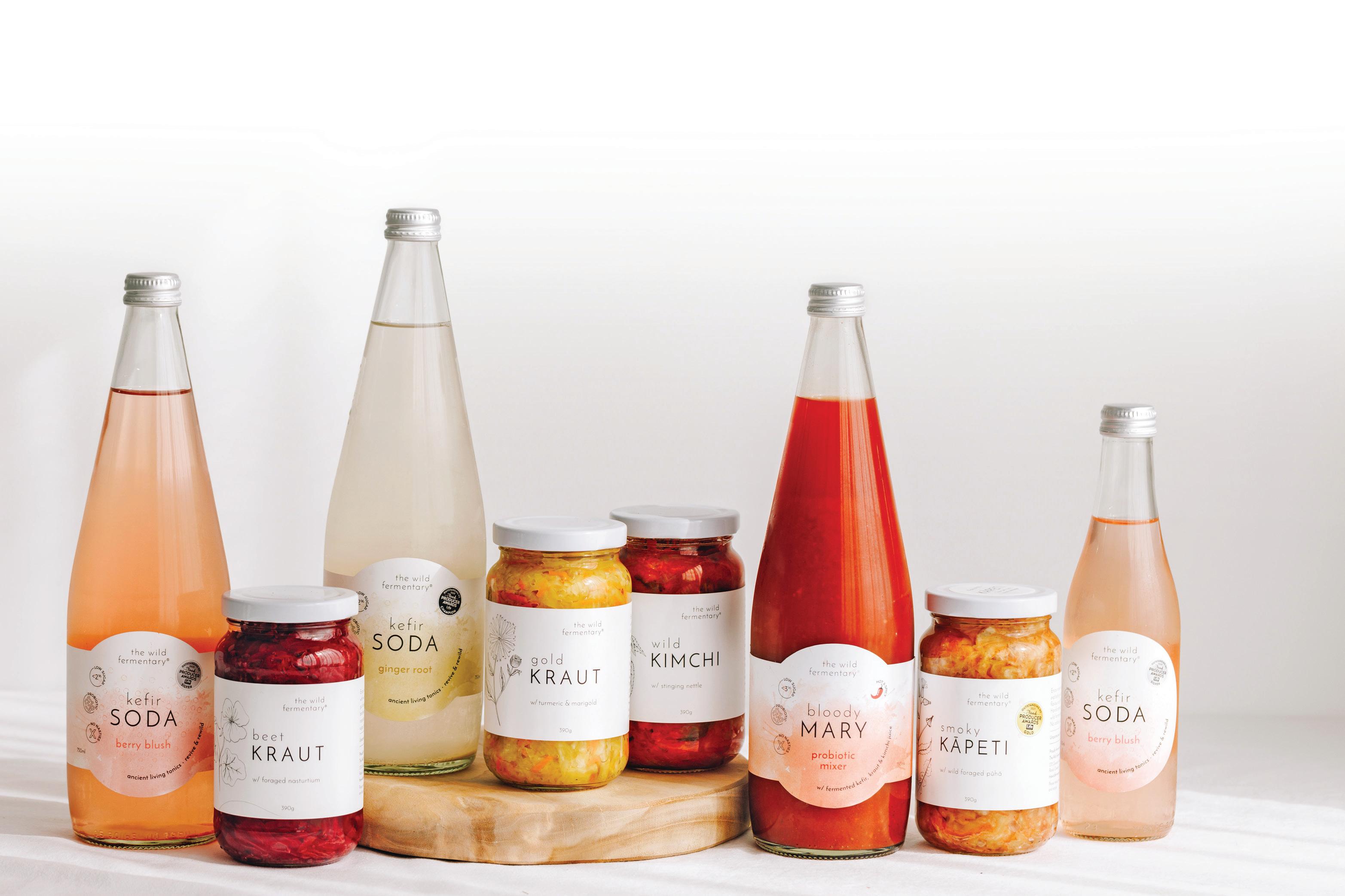
Mersey Valley cheese is best known for its unique explosion of flavour, crumbly texture and creamy melt in your mouth sensation. This iconic cheese is available in four flavours including: Classic - cheddar, Original - bold vintage flavoured cheddar, Pickled Onion –made from brown pickled onions and Jalapeno - packed with a punch of spicy Jalapeno peppers. The range is available in both 235g & 80g serving sizes suitable for a personal at home snack or as a shareable size if you are looking to entertain. Mersey Valley Classic is the largest selling specialty cheese in Australia. This range of cheese is one not to be missed! Check out what all the fuss is about.

For more information, visit www.merseyvalley.com.au or follow @merseyvalleycheddar on Instagram.

Rebel Bakehouse‘s new ‘HAPPY GUT’ wraps are beneficial for your gut and the wrap category, with prebiotic fibre for healthy gut balance.
The new Wholegrain Prebiotic Goodness wraps are packed full of the flavour and goodness of wholegrain, seeds with a twist of prebiotic fibre for a happy gut. They are unique new wraps for the growing Wholegrain/Seeded wrap segment.

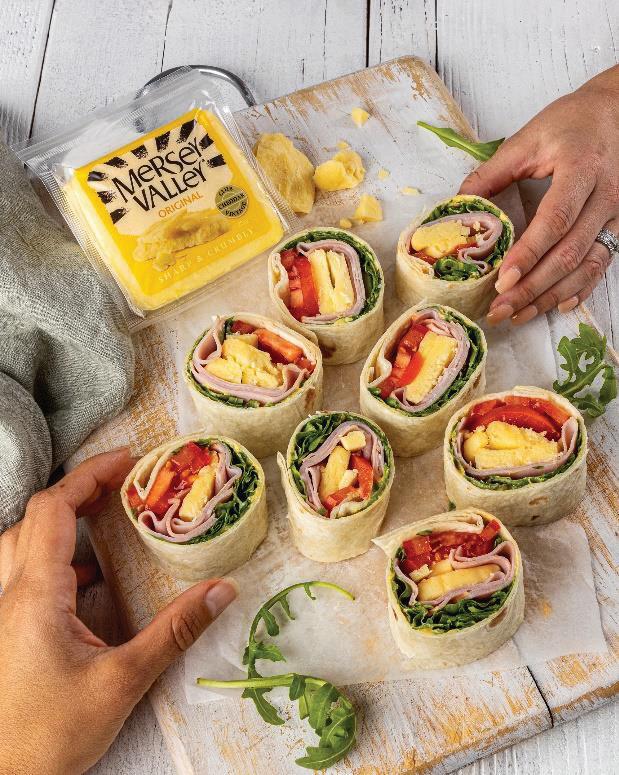
Filling the gap for a Spinach wrap in the Low Carb segment, the fastest growing segment in wraps at 12 percent*, Rebel’s new Low Carb Spinach wraps have 32 percent less carbs** with the added benefit of prebiotic goodness for a happy gut. Boasting a 4 Health and a 4.5 Health Star, plant-based and vegan-friendly, these wraps tick all the boxes.
Products that nurture gut health are trending globally. Prebiotics (fibres that feed healthy gut bacteria) help maintain a balanced gut and keep you regular. The Rebel bakers have found a way to capture these successfully in their wraps so they not only taste great but promote a happy gut.

*IRI Scandata: NZ Grocery, Quarter to 13/11/22 $ Percentage Growth vs Prior Year
**Carbs compared to Rebel Bakehouse Spinach Wraps
For more information, visit www.rebelbakehouse.co.nz. Sales queries, please contact your Alliance Sales Representative 09 280 2926

The team at Griffin’s has listened to New Zealanders nationwide and has brought back its beloved Candy Squiggles, joining the Hokey Pokey and Raspberry Jube Squiggles on shelves.
The Candy Squiggles biscuits, commonly called the ‘Pink and Green Squiggles’, comprise a chocolate-flavoured biscuit base topped with the delicious combination of chocolate-flavoured cream and crunchy candy nuggets covered in smooth milk chocolate.

The iconic Kiwi beer brand, Export, has launched its new Export Ultra Low Carb Lager. The new brew is a crisp and refreshing lager that is 99 percent carb and sugar-free, containing only 26 calories per 100 ml. Made for Kiwi beer drinkers who appreciate easy-drinking, low-bitterness lagers, Export Ultra Low Carb Lager is perfectly balanced with an exceptionally crisp and refreshing finish.

Pic’s is releasing a fresh batch of one of its fan-favourites, Peanut and Chocolate Butter. After a significant hiatus from the shelves, Pic’s have run an encore release of the Peanut and Chocolate Butter. Packed with protein from Pic’s signature fresh roasted Hi Oleic peanuts and mixed with chocolate.
